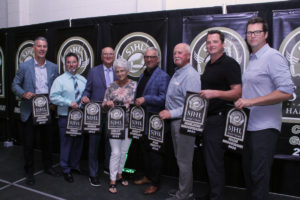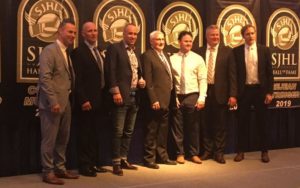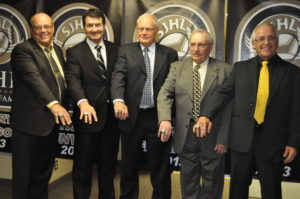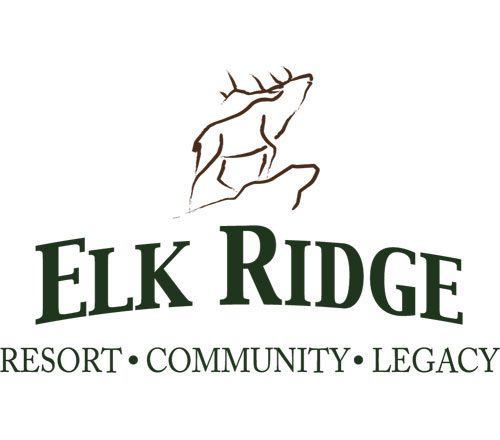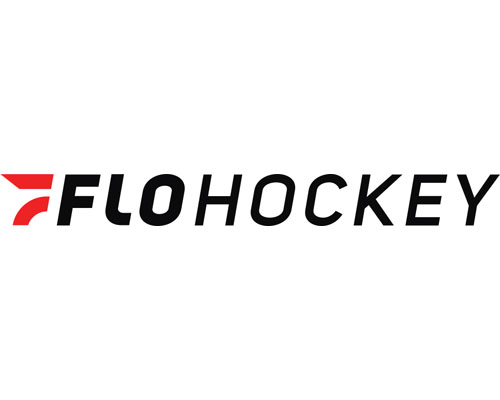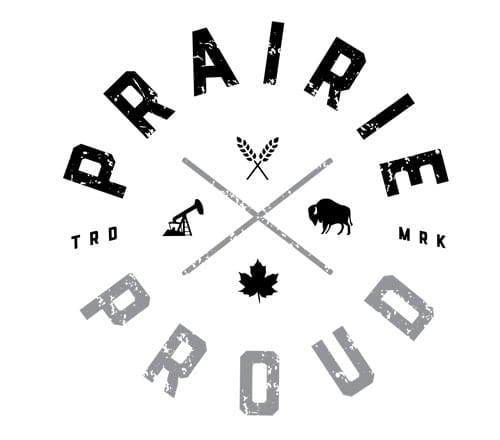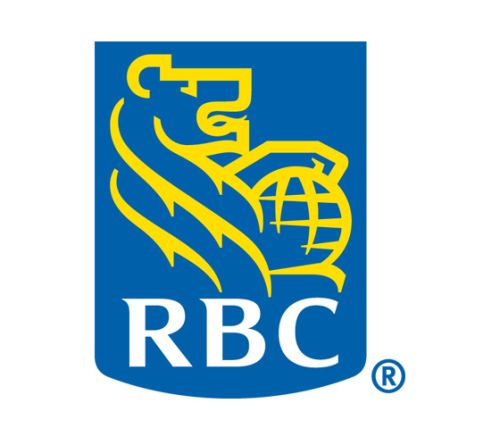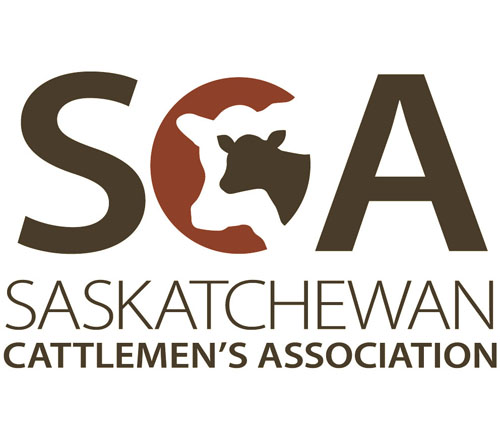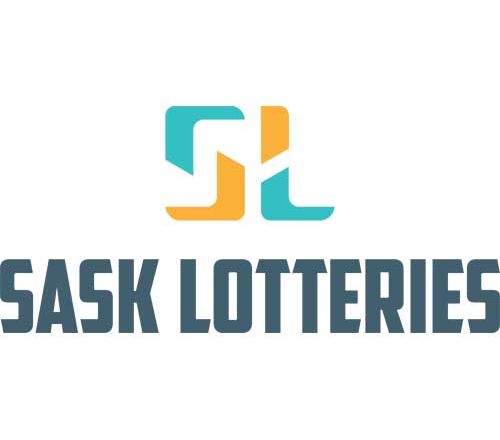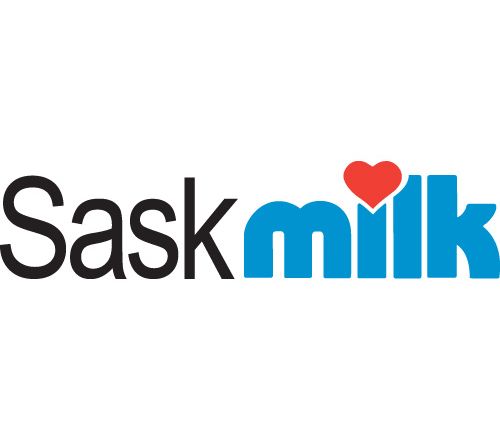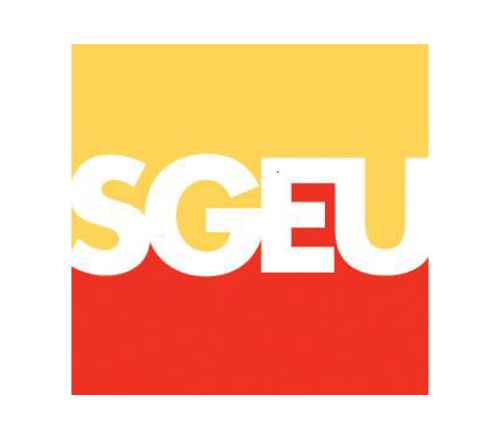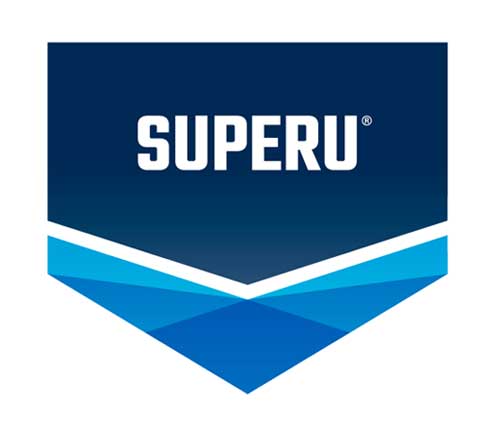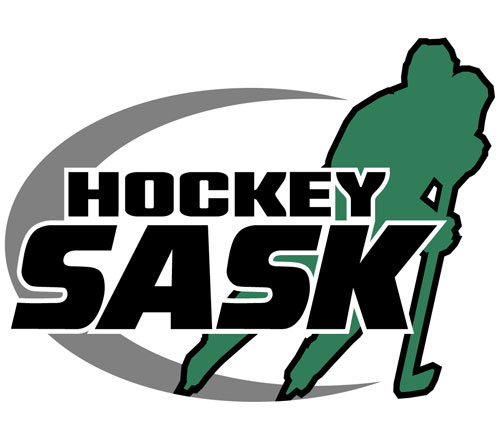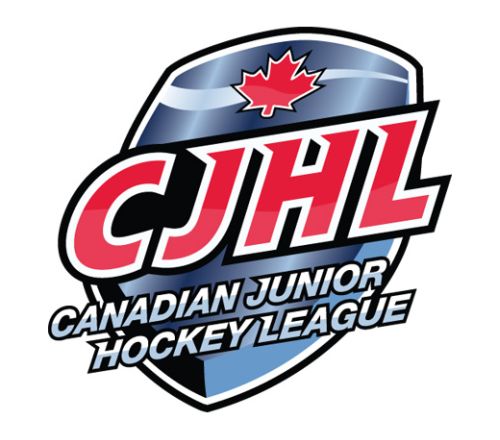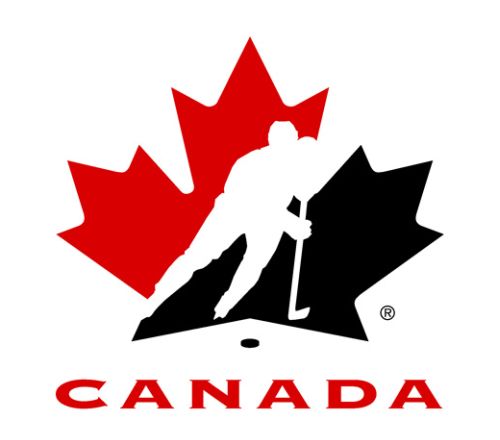BATTLEFORDS - JUNE 22, 2024
by Kennedy Schmidt and Tyler Beatch
George Family – William (Moe), Albert (Jeep), David, & Micheal George
The first generation of the George family to be recognized are brothers William and Albert George. Better known as "Moe" and "Jeep". They founded, managed, and coached the Beaver Bruins Junior Hockey Club for players 15 to 18 years old. This was the first junior hockey program in the Battlefords. In 1961, the Beaver Bruins were converted to a Junior B hockey club. Through tireless lobby efforts by Jeep and Moe and others in the community, The North Battleford Civic Centre was opened in 1962. These efforts laid the groundwork for Junior A Hockey to be later established here in the Battlefords. Jeep’s dedication would not have been possible without the support of his wife, Joyce. Not only did she raise their 4 children, but she was at the rink taking tickets, washing laundry, feeding the team, and much more.
The second generation of the George family we want to recognize is Jeep's son, David George. David grew up at the rink following his father and uncle’s footsteps. These endless hours spent at the rink translated into a successful junior hockey career in the AJHL, WHL, and SJHL where he played his final season of junior hockey in 1974-75 with the North Battleford Barons. That season, David led the league in scoring with 66 goals & 95 assists for 161 total points. This is still the single-season points record for the Barons/North Stars franchise to this day. David would later coach/manage the North Stars three times and serve as a board member. He was the one responsible for changing the team colours to red, white, and blue to replicate the New York Rangers; the team his dad Jeep served as a scout for from 1969-1975.
The third generation of the George family to be inducted is David's son, Michael. Michael played all his minor hockey in the Battlefords, except his final year where he went to play in Saskatoon for the Midget AAA Contacts. In the 2003-04 season, he returned home to start his junior career with his hometown team, the Battlefords North Stars. Michael was an impact player right from his rookie season. In the 2004-05 season, Michael led the team in scoring and helped the North Stars reach the SJHL Finals. In his third and final season, Michael once again led the North Stars in scoring and made another trip to the SJHL finals. Michael was a fan favourite due to his physical play and scoring efforts ending his SJHL career with 167 GP-74G-109A-183PTS.
Smith Family
The first generation of the Smith family to be recognized is Dr. Ian Smith (Doc). Doc was the North Stars President, SJHL Governor, and team doctor from 1989 to 1999. Doc helped lead the North Stars to success through many moves, including helping save the team from being sold to the City of Saskatoon in April 1990, assisting in the hiring of Todd McLellan in 1993 who went on to be an NHL coach, and building for the team's first SJHL Championship coming at the end of his tenure. Doc’s success with the North Stars was made possible by great support from his wife Gloria who was a billet mom for the team and a bingo volunteer to help raise funds for the team.
The second generation of the Smith family to be recognized is Doc’s children, Martin Smith & Fiona Smith-Bell. Martin joined the North Stars in the 1987-88 season. The following 2 years, he split play between the North Stars and the WHL. In 1990-91, Martin returned home to finish out his final 2 seasons with the North Stars, where he became the second North Star player to reach 50 goals in a season, the franchise leader in goals and sits second in points and games played. Martin finished his SJHL career with 229GP-142G-207A-349PTS. Martin went on to play in the ECHL, BHL & WCHL before returning home to the Battlefords. He has since worn many different hats for the North Stars Hockey Club including Assistant Coach, play-by-play, colour commentator, and fan. Fiona Smith-Bell's hockey resume is a long one as well; growing up she was involved in figure skating before she found her love for hockey. At that time, women’s hockey was just gathering momentum. She went on to be named captain of the first-ever Saskatchewan women’s hockey team to compete at the Canada West Winter Games. Fiona's career highlight came in 1998 when women’s hockey was added as an event to the Winter Olympics for the first time. Fiona’s team battled their way to win a silver medal. While Fiona spent a lot of time watching her brother wear the North Star colours, she was recently able to see her son wear not only the same colours but the same #27 too.
The third generation of the Smith family to be recognized is Kian Bell, son of Fiona Smith-Bell. Kian joined the North Stars in the 2022-23 season which became a record-breaking year, not only for himself but also the franchise. Kian was able to become only the 3rd North Star in history to score 50 goals in a season, with the last one being his Uncle Martin. He also put up a 100-point season, won an SJHL championship, and won a silver medal at the National Junior A Championship. He achieved all these milestones while donning the same #27 that his Uncle Martin Smith wore 35 years earlier. Kian finished his junior career with back-to-back SJHL MVP, leading scorer, and top forward awards with a final career total of 92GP-91G-105A-196 PTS. With that, he moves up to 4th in the franchise’s all-time scoring leaders.
2016-2017 Battlefords North Stars
Our next SJHL Hall of Fame Inductee is the 2016-17 Battlefords North Stars. This team ended the regular season with a 48-9-1 record posting 223 goals for and only 103 goals against, the SJHL record for fewest goals against in a season! This had them finish first in the league heading into the playoffs, where they put up a 12-0 record to sweep all rounds against Weyburn, Estevan & Flin Flon; this had only been done 2 times prior in SJHL history, with the most recent being over 30 years ago! This brought the North Stars their 2nd championship in history. The team was led offensively by Coby Downs and Layne Young who finished 4th and 5th in points in the league and defensively by veteran duo Kendall Fransoo and Connor Sych, as well as rookie pairing Levi Kleiboer & Cody Spagrud. Goaltending was a key factor in their success with Taryn Kotchorek leading the league with a 1.61 GAA in 32 games and Joel Grzybowski posting a 1.66 GAA in 26 games. The duo finished 1st and 2nd in every goaltending statistic in the league. This team boasted a record-breaking 17 players from the Battlefords and surrounding area. Leading the team were Head Coach Nate Bedford and Assistant Coach Braeden Johnson, who were supported by Athletic Therapist Robert Tanner and Office/Marketing Manager Caitlyn Gray.
Travis Clayton
Travis Clayton was born on March 9, 1976, in Paradise Hill, Saskatchewan. Travis joined the North Stars in 1992 as a 16-year-old and played with them until 1997. During his 308 SJHL games played, Travis put up 139 goals and 258 assists for 397 points with 374 penalty minutes. In his 1994-95 and 1996-97 seasons, he hit 102 and 122 points respectively to join an exclusive club of 100-point season SJHL players. Travis then went on to play a pro career within the CHL and IHL from 1997-2011 where he amassed 1013 points in 913 games for the Wichita Thunder, Detroit Vipers, Kansas City Blades, and Bossier-Shreveport Mudgbugs. In the 2011-12 season, Travis moved to the Chinook Hockey League to play 21 games with the Lloydminster Border Kings where he would officially hang up the skates as a player. He would conclude his career as a player with 1,221 games played, 528 goals and 882 assists for 1,410 total points. Travis then transitioned to being a coach in multiple different leagues including the WSHL, AMHL, AJHL, AMBHL, and AEHL U18 with his most recent job in the AJHL as an Assistant Coach for the Whitecourt Wolverines.
Blake Tatchell
Blake Tatchell was born May 23, 1991, in North Battleford, Saskatchewan. Blake played hockey in the Battlefords almost his entire career. Blake got his first taste of the SJHL in 2007-08 where he suited up for one game as an AP with his hometown North Stars. He then played for the Midget AAA Stars the following year, where his talent showed, putting up 51 points in only 43 games, before returning to the North Stars full-time in 2009. Blake then played 169 games as a North Star, scoring 78 goals and 112 assists for 190 points. As a hometown boy, Blake was a fan favourite of many during his time wearing black and silver and was an Assistant Captain during his final season. In his 20-year-old season, Blake was signed by the University of Alaska-Anchorage NCAA Division 1 where he played for 4 seasons totaling 142 games, 31 goals and 72 assists for 103 points. He finished his NCAA career as an assistant captain before suiting up for 5 games with the Lake Erie Monsters of the AHL in 2015-16. In the following season, Blake played for the Wichita Thunder in the ECHL where during 56 games he put up 29 points. Since returning home, Blake has played a handful of games with his 2 brothers on the Meota Combines senior team. He is now a part of Trach Power Skating and holds many clinics in the Battlefords. Blake also helps run the John Paul ll hockey school, helping to shape the skills of future players.
Drew Bagnall
Drew Bagnall was born October 26, 1983 in Oakbank, Manitoba. Drew joined the North Stars in the 2000-01 season and played until 2003 as a defenseman. In his final season, he was named the SJHL Defenseman of the Year, the first ever in franchise history. He also recorded the first 50+ point season as a defenseman ending that year with 17 goals and 47 assists for a total of 64 points. Drew signed with St. Lawrence University in New York NCAA Division 1 where he played for four seasons totaling 137 games with 19 goals and 53 assists for 72 points. In his final season of NCAA, he wore the “C” for St. Lawrence. In 2007, Drew joined the Manchester Monarchs of the AHL where he remained until the 2009-10 season (aside from a brief stint with the Reading Royal of the ECHL), once again finishing out with the “C” on his jersey. With the Monarchs, Drew played 201 games, putting up 4 goals and 29 assists for 33 points. In 2010-11, he suited up for two games in the NHL with the Minnesota Wild, before returning to the AHL for another five seasons; 3 of which were played with the Houston Aeros where Drew once again was the captain in his final season there, and his final 2 with the Rochester Americans as Captain in both. During those 5 seasons, Drew played 283 games with 6 goals and 34 assists for 40 total points. He retired from his career as a player after 5 games in the Chinook Hockey League for the Bentley Generals in the 2015-16 season. As a player, Drew Bagnall played 803 games and put up 67 goals and 208 assists for 275 career points. Some of his career accolades include winning the 2002-03 SJHL Defenseman of the Year award and being named to the SJHL’s first All-Star Team. In the 2006-07 season in the NCAA, Drew was named to the NCAA (East) First All-American Team, All-Tournament Team, and First All-Star Team; he also won Player of the Year, Best Defensive Defenseman and was a Top Collegiate Player (Hobey Baker Award) Finalist.
Blair Atcheynum
Blair Atcheynum was born April 20, 1969, in Estevan, Saskatchewan. In 1984-85, he played for the North Battleford U15 AAA Stars before joining the North Stars at the age of 16 for the 1985-86 season where he split his time with the Saskatoon Blades of the WHL. In 33 games as a North Star, Blair put up 16 goals and 14 assists for 30 total points. From 1985 to 1989 Blair played in the WHL for the Saskatoon Blades, Swift Current Broncos, and Moose Jaw Warriors. During this time, he put up 108 goals and 89 assists for 197 total points, 138 of which came from his final season as a Moose Jaw Warrior. In 1989, Blair was drafted in round 3, 52nd overall by Hartford Whalers. He then spent the next twelve seasons playing between the AHL, ECHL, IHL and NHL for various teams. In the AHL, Blair played for the Binghamton Whalers, Springfield Indians, New Haven Senators, Portland Pirates, Worcester IceCats, Cape Breton Oilers, Hershey Bears, and Norfolk Admirals. In his time in the AHL, he played 553 games putting up 196 goals and 233 assists for 429 total points. In the ECHL, Blair played for the Colombus Chill for 16 games, scoring 15 goals and 12 assists for 27 points. In the IHL, Blair played with the Minnesota Moose & Chicago Wolves for 24 games putting up 16 goals and 14 assists for 30 points. In the NHL, he played for the Ottawa Senators, St. Louis Blues, Nashville Predators, and Chicago Blackhawks, during which Blair played a total of 196 games, scoring 27 goals and 33 assists for a total of 60 points. As a player throughout these leagues, Blair has played 1,010 games with 367 goals and 412 assists for 779 points. In the 1988-89 season, Blair was named to the WHL (East) First All-Star team and won the WHL Most Sportsmanlike Player award. Blair was an AHL Calder Cup Champion in the 1990-91 and 1996-97 seasons. He was also named to the AHL First All-Star Team in 1996-97. After retiring as a player, Blair returned to the Battlefords and took up coaching with the North Stars as an Assistant Coach until 2015.
Wade Belak
Wade Belak was born July 3, 1976, in Saskatoon, Saskatchewan and moved to Battleford with his family at the age of 6. He grew up playing hockey in the Battlefords, including playing for the North Battleford U15 AAA Stars. Wade became a North Star at 16 in the 1992-93 season; he played 50 games, putting up 20 points, before finishing out his season and junior career with the Saskatoon Blades of the WHL. In the WHL, Wade played 211 games, putting up 11 goals and 42 assists for 53 points. Wade was drafted by the Quebec Nordiques in the 1st round, 12th overall, just 5 days before his 18th birthday in 1994. After finishing his junior career, Wade spent a few seasons bouncing back and forth between the AHL and NHL before landing closer to home for the 1999-00 season with the Calgary Flames. He then went on to be a part of the Toronto Maple Leafs, Florida Panthers, and Nashville Predators. In the AHL, Wade played for the Cornwall Aces, Hershey Bears, and Saint John Flames where he played 110 games and put up 1 goal and 10 assists for 11 total points and 460 penalty minutes. In the NHL as a defenseman and known enforcer, Wade racked up 1263 penalty minutes and 33 points in 549 games.
Tracy Cook
Tracy Cook’s introduction to the SJHL began early in his life as his father, Bert, was one of the first coaches of the Barons franchise. Before that, Bert assisted Moe and Jeep George with the Bruins franchise. In 1983, Tracy started his career as a linesman for the SJHL. The following season, he became a referee where he remained until 2007. In 2008, Tracy followed in his father's footsteps, but instead of coaching players, he decided to coach the officials. Tracy became an Officials Supervisor in the league, before becoming the Referee in Chief for the SJHL until 2017.
Todd McLellan
In 1992, Todd McLellan answered a North Stars head coach hiring ad in the newspaper and was hired by Dr. Ian Smith. Todd turned the team around from a 16-39-9 record to a 35-22-11 record over his two seasons as Head Coach for the North Stars. In 1994, McLellan was hired as the head coach and general manager of the Swift Current Broncos of the WHL. McLellan was named WHL Executive of the Year in 1997 and Coach of the Year in 2000 for his success with the Broncos. As a result, McLellan was hired by the Minnesota Wild to coach the Cleveland Lumberjacks of the IHL. After the IHL folded in 2001, McLellan and his staff were transferred to the Wild's new affiliate, the Houston Aeros of the AHL. As coach of the Aeros, McLellan led Houston to the Calder Cup in 2003.
In 2005, Mike Babcock hired McLellan to serve as his assistant coach with the Detroit Red Wings. Under his watch, the Red Wings had the top-ranked power play in the NHL, finishing first in power play efficiency in 2005–06 and third in 2007–08. As a member of the coaching staff, McLellan won his first Stanley Cup with the Red Wings in 2007–08. On June 11, 2008, the San Jose Sharks hired McLellan to become their new head coach. He would end up the head coach for the Western Conference All-Star team and lead the Sharks to their first Presidents' Trophy with an NHL-leading 117 points to finish the regular season and finished third in voting for that season's Jack Adams Award.
McLellan coached the Canadian national team at the 2015 World Championship, where the team won the title for the first time since 2007 with a perfect 10–0 record.
In 2015, he was named head coach of the Edmonton Oilers, becoming the 14th head coach in team history. McLellan's first season in Edmonton was a rebuilding one. The Oilers finished with 70 points, the second-worst record in the league. However, the following season, the Oilers tallied over 100 points for the first time since the 1980s dynasty and made the playoffs for the first time in 11 years. In 2019, the Los Angeles Kings named McLellan head coach where he coached until February 2024.
Kelly McCrimmon
Kelly McCrimmon spent his first years coaching junior hockey in the SJHL, starting with the North Stars for two seasons, then one with the Lloydminster Lancers from 1985-1988. In 1988, he re-joined the Brandon Wheat Kings as an assistant coach, then later became general manager in 1989, as well as a few stints as head coach along the way. In 1992, he became the minority owner of the Wheat Kings, purchasing one-third of the franchise. In 2001, he became the sole franchise owner after buying the remaining shares from Bob Cornell.
In 1995–96, McCrimmon won his first championship as a WHL general manager and his second championship with the Wheat Kings.
In 2004, he took over the coaching duties for the Brandon Wheat Kings. In his third stint as head coach of Brandon Wheat Kings, he appeared in the finals as head coach and general manager. In 2011, he stepped down from his coaching duties only to return in the 2013-14 season for the Wheat Kings for the next three seasons. During the 2014–15 season, he coached the Wheat Kings to the Western Hockey League finals, losing to the Kelowna Rockets. The next season he was brought on as an assistant coach for Team Canada at the World Junior Championships in Helsinki, Finland. The Wheat Kings had a second stint at the finals that year, winning the Ed Chynoweth Cup against the Seattle Thunderbirds in five games.
After 26 seasons with the Brandon Wheat Kings, on August 2, 2016, McCrimmon was named the first-ever assistant general manager of the new NHL expansion team, the Vegas Golden Knights. In McCrimmon's first year as assistant general manager, the Vegas Golden Knights became the second expansion team ever, after the St. Louis Blues, to make the Stanley Cup Finals. On May 2, 2019, he was promoted to general manager. On June 13, 2023, the Golden Knights defeated the Florida Panthers to win the Stanley Cup. By winning the Cup after six seasons, they become the fastest team to win the Stanley Cup from the time of expansion.
North West Hockey Development Association
North West Hockey Development Association has been active in the Battlefords since January 1982. They were initially started as a booster club for the Battlefords AAA Stars but have evolved to provide support for the hockey community in the Battlefords. The North West Hockey Development Association is a group of volunteers that support the development of hockey in the area and their support is extended to all stakeholders including – Battlefords North Stars of the SJHL, AAA Stars of the SMAAAHL, and Battlefords Minor Hockey Association which consists of approximately 50 minor hockey teams each season.
Through their countless hours of volunteering, they run the concession at the Access Communications Centre (formerly Civic Centre). This tireless group of volunteers provides support to the local organizations while assisting with additional projects including improvements to the Access Communications Centre, purchasing the current score clock and serving as key contributors to the development of a new arena complex in the Battlefords.
In April of 1990, North West Hockey Development helped to purchase the Battlefords North Stars to keep the team from moving to Saskatoon. They then transferred ownership to the Battleford North Star Fan Club run by Dr. Ian Smith.
Without the support and contributions of the North West Hockey Development Association and its volunteers, hockey in the Battlefords would not be where it was today.
HUMBOLDT - AUGUST 5-6, 2022
BOB BEATTY
Bob Beatty was the head coach of the Humboldt Broncos from 1996-2004. In the 2002 the Broncos won the SJHL Championship. In total Bob has been a head coach in the SJHL for 25 years winning his second championship in 2009. Bob, a native of Watrous, SK. continues to work as an assistant coach in the BCHL. Congratulations Bob on your coach induction into the SJHL Hall Fame.
DEAN BROCKMAN
Dean Brockman began his coaching career as an assistant coach in Humboldt in 1997. The St Benedict native became head coach of the Broncos in 2004 and remained head coach until 2013. During that time Brockman lead the Broncos to two SJHL championships in 2002 and 2007. An RBC Royal Bank Cup finalist in 2007, the Broncos broke through and won the national championship in 2008. After his time in Humboldt Brockman went onto to coach the Saskatoon Blades and later lead the Swift Current Broncos for four seasons. Congratulations Dean on your induction into the SJHL Hall of Fame.
CHRIS CUTHBERT
Raised in Brampton, Ontario Chris Cuthbert began his broadcast career in Yorkton, Saskatchewan calling games on GX94 for the Yorkton Terriers in 1979. The Terriers were coached by Jerry James and featured the likes of Joe Kocur, Dave Brown, and Ken Daneyco - all future NHLers. In Yorkton he perfected his call and went on to an illustrious broadcast career working for CBC, TSN and the NHL network calling contests for the NHL and CFL.
In 1998, Cuthbert won a Gemini Award for Best Sports Broadcaster, and in 2004 he was recognized by Sports Media Canada as Sportscaster of the Year. In 2006, Cuthbert received another Gemini, and in 2014 Cuthbert was inducted into the media wing of the Canadian Football Hall of Fame. Congratulations Chris on your induction as a broadcaster into the SJHL Hall Fame.
BRETT STEWART
Brett Stewart grew up playing hockey in Regina. In 1986 he joined a powerhouse Humboldt Broncos team whose record was 55-9. Brett remained with the Broncos for three seasons and his play lead him to the NCAA with St. Cloud State. After St. Cloud Brett played professionally in the ECHL before embarking on an eight-year professional career in Europe. After his playing days Brett began coaching in Norway for six seasons before joining the Arizona Coyotes as a development coach and European scout. Congratulations Brett on your induction as a Player into the SJHL Hall Fame.
SHELDON BROOKBANK
Sheldon Brookbank grew up in Lanigan but loved watching his father coach with the Humboldt Broncos and his brother Leigh play with the Yorkton Terriers. After leaving the Lanigan minor hockey system Sheldon played for the Saskatoon Contacts before joining the Broncos as a young hard-nosed defenseman for three seasons. After graduating from the SJHL, Sheldon toiled in the ECHL and AHL before joining Nashville, New Jersey, Annaheim and Chicago in the NHL. Known as a steady, hard stay at home defenseman Sheldon played almost 15 years professionally. He was known as a great teammate and as a guy who always answered the bell. Brookbank won a Stanley Cup in 2013 with the Hawks. After his playing days Brookbank coached in Rockford and Chicago. Congratulations Sheldon on your induction into the SJHL Hall Fame.
WADE BROOKBANK
Wade Brookbank was raised in Lanigan but was considered a late bloomer by jockey standards. Wade joined the Melville Millionaires as a 19-year-old and played two seasons with the Moneymen. Wade played professional right out of the SJHL. Over his 16 years of professional hockey he played in the WCHL, CHL, AHL, and NHL amassing 415 games in the AHL and 127 in the NHL. A great teammate and a player who never shied away from the heavy going. Congratulations Wade on your induction into the SJHL Hockey Hall of Fame.
KELLY CHASE
Kelly Chase grew up in Porcupine Plain. He first laced up the skates with the Humboldt Broncos in 1985 and his hard work, determination, and his willingness to compete made him a fan and team favorite. Kelly went onto play for the Saskatoon Blades for three seasons before the same type of play that characterized him as a Bronco followed him to the IHL and then NHL where he toiled for the St. Louis Blues, Hartford Whalers, and Toronto Maple Leafs. A veteran of over 450 NHL games while amassing over 2000 penalty minutes Chase was always Saskatchewan tough. Congratulations Kelly on your induction into the SJHL Hall of Fame.
JARED BEDNAR
Jared Bednar grew up in Humboldt watching the Humboldt Broncos. As a minor hockey player his size, athleticism and hockey adeptness made him a legitimate junior prospect. In 1989 Jared cracked the Broncos and played for the team that he idolized. Jared went onto play in the WHL for Saskatoon, Spokane, Medicine Hat and Prince Albert. He later took his defensive skills to the ECHL, AHL and IHL for 8 professional seasons. Following his hockey career, Jared began coaching professionally in 2002 in the ECHL as an assistant. Soon he became a head coach in the ECHL, an Assistant in the AHL, a head coach in the AHL and then a head coach in the NHL. In his coaching career Jared has the dubious distinction of winning championships at the ECHL, AHL and NHL levels. Congratulations Jared on your induction into the SJHL Hockey Hall of Fame.
ELGAR PEDERSON
Elgar Pederson was born in 1936 in Annaheim, SK. In 1962 his family moved to Humboldt where Elgar immediately became immersed in volunteering around the rinks. In 1970 he became the team’s trainer and equipment manager, a role he continued in for almost 30 years. What he did for the Broncos he also did for minor sports in Humboldt lending a hand and volunteering wherever help was needed. Elgar was a builder but was also a legend. Elgar’s love for volunteerism, his love for hockey, his love for his community, and his love for the Humboldt Broncos began very early and continued throughout his life. Elgar was inducted into the Humboldt Hall of Fame in 1998 and the community arena was named after him in 1999. Congratulations to the Pederson family on Elgar’s induction into the SJHL Hall of Fame.
2007-08 HUMBOLDT BRONCOS
After a heartbreaking game 7 loss in quadruple overtime in the ANAVET Cup finals in 2007, the 2008 Humboldt Broncos had a chip on their shoulder and had only one goal in mind: the national title. With 15 returning players, there were high expectations and a strong desire to erase the disappointment from the previous year. The determined team breezed through the regular season with 48-9-1 record. The 2008, Humboldt Broncos beat the Nipawin Hawks in 5 games in the first round, swept the Flin Flon Bombers in the next round and although down to the Kindersley Klippers three games to one in the final series, they rattled off three straight victories to qualify for the ANAVET Cup. At the ANAVET Cup the Broncos swept the Portage Terriers and were off to the RBC Royal Bank Cup in Cornwall Ont. At the national championship, the Broncos and the Camrose Kodiaks met up in the finals. The two top teams in the CJHL all season. In the end, the Broncos were able to prevail behind the strong goaltending of Taylor Nelson. The best word to describe the 2008 Broncos: redolent. All season the team was 6-0 in elimination games. Congratulations on your induction into the SJHL Hall of Fame!
NIPAWIN - AUGUST 3, 2019
GERALD BOTTERILL
Gerald was a very community-sports minded Individual and hockey was his number one sport.
When it became apparent that Nipawin was ready for a higher level of hockey, Gerald, along with a group of interested persons, pursued a Jr. A Franchise for the town of Nipawin. This was achieved and put into place for the fall of 1985 and to this day it has been a successful franchise in that it is a tremendous source of entertainment for our community. It has helped to put Nipawin on the map.
Gerald worked hard with the coaches, the team and the directors. He was always there with words of encouragement and worked as hard as the rest to make the franchise a success.
One of his main objectives was to work hand-in-hand with minor hockey and because this was accomplished everything worked well.
A Scholarship Plan was very important to him so he had this put into place and organized events to help raise funds for it. He felt that it was important for the team and an incentive to draw players to the community.
He had his own unique way of organizing fundraisers and these included bingos, raffles, concerts, tail gate parties. It was Gerald's idea to start the Radio Auction, which was, and still is, one of the major fundraisers for the club.
When the franchise was achieved for Nipawin in the fall of 1985 Gerald served as its first president from 1985-1990. He also served as a league governor with the SJHL during this time. In 1993-1994 he again served as vice president for the Hawks.
Today the fundraising continues- the Ag Venture is one of the biggest, it has the invaluable support from the farming community to make it a success. The Tobin Lake Fishing Tournament is also a popular one, with of course the raffles-- they include selling tickets for boats, vehicles, quads or whatever the organizers think will be a good sell. Thanks has to be extended to all those dedicated volunteers.
Gerald would have been very pleased to be included in the inductee list. He was involved in the Nipawin Hawks because he loved the challenge and the hockey. Congratulations to all the other inductees, you all have an important part in the Jr. Hawks history. Thanks to the organizers, it’s been a wonderful weekend.
GREG CLASSEN
Greg grew up on the family farm three miles north of Aylsham. Greg’s Dad (Gord) built an ice rink for all the children and from an early age he learned to skate. Countless family hours were spent out on the rink, most notably with Greg’s brother Bryce, sister Lori, cousin Cris and many friends and neighbours.
Greg’s first year of organized hockey was with the Zenon Park Dragons at age four. The following year Greg began playing in Carrot River where some awesome memories were made. When Greg was in the sixth grade, the school in Aylsham closed and Greg was transferred to Nipawin. That year began about a 10-year run of wearing the Hawks black and gold.
After a one-year stint with the Tisdale Trojans of the Saskatchewan Midget AAA Hockey League, Greg entered the SJHL with the Hawks for the 1994-95 season where Greg was fortunate to skate along side his brother and cousin for a few seasons. Greg spent four years with the Hawks playing in 223 games and registering 198 points on 73 goals and 125 assists.
His play with the Hawks got him a scholarship to Merrimack College, an NCAA Division 1 school, and after collecting 25 points in 36 games in his first season he was selected to the NCAA Hockey East all-rookie team.
Greg decided to turn professional after just two years at college and in his first full season as a pro he experienced the ultimate thrill when he dressed for 27 games with the National Hockey League’s Nashville Predators. With two goals and four assists during that stretch he remained with the NHL club for most of the next season and had 11 points in 55 games.
Greg was back in the American Hockey League with the Milwaukee Admirals for the 2003-04 campaign, but even that worked out well as he was part of a Calder Cup-winning team that season.
Greg bounced around the AHL for the next few seasons and since 2008-09 he has been a fixture in European professional leagues. In fact, this spring as a 41-year-old, he completed a spectacular campaign that saw him collect 46 points in 48 games with Rostock Piranhas of the Germany3 League.
DEREK CRAWFORD
For four seasons Derek Crawford put the Nipawin Hawks on the Canadian Junior Hockey League map.
In his rookie season Crawford scored 41 goals and totalled 78 points in 64 games. He followed that up with 60 points in 57 games as a sophomore and a year later he tallied 73 points in 59 games. His final season was his best when Crawford tore up the league netting 46 goals and setting up 49 others for 95 points in just 64 games.
All totalled, Crawford’s name is at the top of almost every offensive category in the Nipawin Hawks’ record book. He has played the most games at 252; is first in points with 306; No. 1 in goals with 132 and assists with 174. Just for good measure he also has sat out the most minutes in penalties with 1106.
Rob Daum, who was Crawford’s coach for three of his four seasons in Nipawin, had this to say about his former star.
“Firstly, please pass on all my best to the people in Nipawin and the Hawks organization. They will always have a special place in my heart.”
As for Derek… HE was a hockey player.
When I first saw Derek, it was my initial training camp with the Hawks, and he was tall and thin. He was all arms and legs stumbling all over the ice like Bambi in the Disney movie when he first stepped on the frozen pond.
He could not skate a lick, yet he always seemed to get to where he needed to go before anyone else. If he had a stride on his opponent, it soon became two. It defied logic but it happened over and over again.
Derek could not pass, but every pass he attempted ended up on a teammate’s tape and you wondered, "how the hell did that happen?”
He could not shoot, but he would float his "feathered wobblers" at the net and inexplicably he would score.
Bambi couldn't handle the puck, but he would go into a corner with four players and come out with possession.
He would attack the best defencemen in the SJHL, arms and legs flailing all over the place, and he would beat them one on one. The puck seemed to be glued to his stick. He kept it when he was on his knees, his back and his ass and trust me with the way he skated he was often in these positions! He couldn't handle it, but he always kept it. It made no sense.
Derek Crawford was tough. A strong Saskatchewan wind could blow him over, but he would fight the toughest players in the SJ to protect his teammates or to send a message.
He feared no one. He had "balls the size of pumpkins".
Bambi was a fierce competitor who played for the team and possessed a burning desire to win.
He didn't have skills better than any other player but Bambi played the game better than most.
Derek Crawford was a hockey player!
For the next decade, Derek enjoyed pro hockey south of the border. He played with Greensboro and Dayton in the East Coast Hockey League; With Dallas in the Central Hockey League; with the Reno Renegades of the West Coast Hockey League and finally for four seasons with the New Mexico Scorpions of the Western Professional League.
Following his playing career, Derek spent 19 years working as the general manager of NRG Staging and enjoying life with his wife Cristy and daughter Rylie.
As you know, Derek passed away unexpectedly at the age of 46. His family was unable to attend tonight, but they send their sincere gratitude to everyone in the town of Nipawin for continuing to celebrate Derek’s life as a Nipawin Hawk.
CURTIS MURPHY
Born and raised in the small farming town of Kerrobert, Saskatchewan, the youngest of six children, five boys and a girl, Curtis Murphy would say his older brothers toughened him up, but he was the baby and was off limits. They did make Curtis work harder and learn faster to try to keep up with them.
Curtis’s hockey career started on the frozen “dugouts” and skating with my family and cousins.
Whether it was playing games, watching games, or officiating games, Curtis’s family winter life revolved around the rink. Curtis was able to have many good coaches, his dad included. They all helped him learn the game and how to play it. Most of the time Curtis’s learning was done trying to keep up with the big boys.
Curtis played out his youth hockey in Kerrobert until Bantam age, when he played a season with the Unity Lazers Bantam AA team. From there he broke the family mold of playing for the Saskatoon Blazers (3 brothers played before him) and went to the rival Saskatoon Contacts.
After his last year Curtis went to Nipawin, having had a brother who played in Nipawin (Todd) before him, with lots to live up to, and he had a great career with the Hawks. As luck would have it Curtis was able to billet with the same family, the Weibe’s. One big reason Curtis only played one year was having a coach like Bruce Thompson who wanted his players to grow and move onto higher leagues. He always was able to get the best out of every player on the roster.
Curtis has many fond memories of his time in Nipawin, rookie parties, tubing in the streets, but also the team they were able to assemble and how the pieces fit together. For an 18 year old farm kid, Curtis enjoyed every minute of his time in Nipawin.
One memory was when the Hawks took their helmets off in Flin Flon sporting their playoff hairdos and got some rather strong responses from their fans. Most which can’t be written!
With this culture he had a strong season and was able to receive offers from Schools in the NCAA. Not really thinking there would be opportunities to go to the NCAA this soon, Curtis went on recruiting trips and settled on University of North Dakota, Fighting Sioux. Again, having a tie to Curtis’s family, an older brother Keith who was currently playing for North Dakota.
Curtis played four full years at North Dakota and one great memory of winning a National Championship in 1997. He was also able to play a full season with his older brother.
After University Curtis started his pro career in Orlando with the Solar Bears of the IHL.
Then it was off to a new league, the AHL after signing with the Minnesota Wild organization, where he won a Calder Cup in 2002 with Houston. A brief stint followed with Nashville’s organization, a year in Milwaukee and another Calder Cup in 2003.
While those were huge career highlights, no championship can compare to his lovely wife Kelli and 4 children Chandler, Hayden, Reese , and Carter.
In the lockout year Curtis made the trek over to Russia to play with the Yaroslavl Lokomotiv. Curtis enjoyed the experience to live a year in Russia and live in a much different culture, before returning to the Houston Aeros, and was fortunate to get the call to the Minnesota Wild for one game in 2002-03.
Curtis decide to make the jump to Europe, having kids in school which was not an easy decision.
Curtis’s new career started in Langnau, Switzerland. Going back to his roots and choosing a smaller farming town to play for, Curtis believes they thought he was crazy for not choosing the bigger city team Bern. He spent four years exploring Europe and Switzerland.
His next travels took them to the city of Linz, Austria and the EBEL league, where he helped them win the EBEL championship in the first year, which set him up for four fun years in Linz.
Curtis’s biggest take away from this was their kids being able to see and experience another culture and also learning the language.
Not wanting to move again in Europe Curtis’s career came to a halt at 39, really was shooting for 40. The children were getting too old and it was time to settle down.
Curtis and his family returned to Canada and set up shop In Calgary for three years, before it was time to return back to Houston, where Curtis and his family currently reside.
NOLAN SCHAEFER
Nolan Schaefer was raised in Yellow Grass Saskatchewan by his parents Peter and Tracy Schaefer. Nolan’s brother Peter was a long time NHL left winger and Gold Medalist for the Canadian World Junior Hockey Team, sister Falin played for the Canadian National Volleyball Team.
During Nolan’s time spent with the Nipawin Hawks, Nolan committed to Providence College where he played four years and graduated with a Bachelors Degree in Fine Arts and a Minor in Art History.
Nolan was named an All American in his Sophomore season as well as the New England Sportswriters Award and Hockey East All Academic Team. He holds the record for most career saves as a goaltender for the Providence College Friars. During his four years in College, Nolan met his wife Lisa and was married at the age of 25.
After his sophomore year at Providence Nolan was drafted in the 5th round to the San Jose Sharks. Nolan went on to play for three seasons in the San Jose Sharks organization. The highlight of his playing career came when he entered the NHL with a 5-0 rookie season start boasting a .920 SVS% and a 1.87 GAA. Unfortunately, that would be the last time Schaefer saw NHL ice. However, he spent many very good seasons in the AHL finishing first in league statistics with the Minnesota Wilds minor league team, the Houston Aeros and playing in the AHL All Star game.
Nolan then made his first venture to Europe by playing one season in the KHL for the CSKA or Red Army under General manager and head coach Sergei Nemchinov. He then attempted to make a comeback into the NHL by signing with the Boston Bruins in 2011 where the team went on to win the Stanley Cup backstopped by Tim Thomas. From there he signed in Ambri-Piotta of the Swiss NLA and received his Swiss passport and finished his last four years in Switzerland.
Amidst all of the hockey movement and playing for over 12 teams, Schaefer’s wife Lisa became severely ill after there first year of marriage in 2005. They spent 7 years during his career going to doctors and specialists trying to find a cure for an unknown and life-threatening illness. The visited over 50 doctors and specialists in 2007 and spent hundreds of thousands of dollars on non-traditional medical therapy’s and treatments. At the end of the 7 years of treatments and anti-biotics Schaefer and his wife refocused their life on God and living the message of Jesus.
Less than three months later Lisa was free of illness and living her life as if nothing had ever happened.
Nolan retired 4 years ago upon the birth of their second daughter to continue the victories of his family life at his new home in Milford, Connecticut. At this time, he joined forces with former New York Rangers goaltender Steve Valiquette in coaching goaltenders for a business called Clear Sight Development and a cutting-edge hockey analytics company called Clear Sight Analytics. Clear Sight Analytics’ growing client list includes the Toronto Maple Leafs and several other NHL Teams and is expected to change how hockey is viewed with a ew perspective on the game.
Nolan now lives with passion and a love for God, fatherhood, marriage, and mentoring young goaltenders and local youth at his Church in Milford. He lives happily with wife Lisa, daughter’s Bella, Rose, and baby Nolyn.... To be continued!!!!
MARK SMITH
Mark Smith was born in Edmonton, AB., but moved to Saskatchewan at the age of 3 and grew up on a farm, 15 miles from Eyebrow, SK. Mark has an older brother and sister, and they kept each other busy making up any games their minds could invent, as well as working on the farm, just like any young kid from Saskatchewan, to help the family business of farming stay afloat. Little did he know, he was learning what hard work and dedication meant, and thought nothing of it, as this was all I knew.
Childhood
At a young age, Mark remembers hockey always being a big part of their household. Being born in Edmonton, and having a lot of family from there, it was easy to be an Oiler fan growing up in the ’80s. Saturday nights were usually spent adjusting the rabbit ears and crowding around the TV to watch the Oilers make easy work of whoever their victims happen to be that night. If we were lucky, Channel 4 looked more like a hockey game than a snowstorm, and we could watch our heroes, Gretzky and Messier work their magic. It wouldn’t take long before number 11 would become my childhood hero, primarily because we shared the same name, but as Mark watched his game evolve over the years, it would be his tough style of play, coupled with his extraordinary skills, that would be the blueprint he would pattern his game after. Just like any other kid that would dream of being their hero, Mark adopted the love for number 11 and claimed it to be “his number”, something that every player holds as being sacred throughout their careers.
At home, Mark and his siblings started skating on a frozen ditch during the winter, but after a lot of begging, convinced their dad to level some ground and make a rink we could flood. Over the years, the rink would evolve, but we could never seem to really dial it in. It always seemed that one end had really good ice, and the other end would be, “dodge the dirt clumps”. We would also eventually convince dad to let us skate on the pond outback. But that was usually 3 hours of scraping snow for about 20 square feet of ice, then usually 2 mins of hockey, before someone shot the puck into the bushes, and the game was over.
Mark spent a lot more time their basement, which their parents let them convert into a hockey rink, we had full-on boards that we had got from ripping down an old grainery and built nets out of 2 by 4’s and chicken wire. There were many intense battles between Mark’s brother and him, and more than a handful of fights to go with it… but I really feel like this was where I started to really develop my skills. Tight area stickhandling, puck protection, and creative dangling. This was a daily occurrence for us now that we didn’t have to battle the elements. Mark remembers spending hours down there and coming up pouring sweat. It was absolute, pure joy for him.
Growing up on the farm, they didn’t have too many options for places to play hockey, just the local team made up of all the farm kids. They spent their early years playing at Brownlee, SK., where they actually had an indoor rink with boards, but in the years to come, after showing our parents that we truly loved the game, and showed some promise. We talked them into making the 30-minute drive to Central Butte, where they actually had artificial ice and a real Zamboni. This meant we didn’t have to watch our parents get out the shovels between periods, and scrape the snow. It was amazing to play on freshly cut ice.
Hockey Career
Central Butte had one of the best hockey programs in the area, and Mark was so excited to play there. Mark remembers being in awe of the older kids, and seeing how good they were, and dedicated to winning. I remember watching Dallas and Clarke Wilm and wanting to be able to play like them. Mark remembers Clarke looking and playing like Messier, which of course blew my mind, and since they played on my brother's team, I would study their moves, steal them, and then use them against the guys I played against. Little did Mark know, this was the start of how he would develop as a player. Mark would focus on the players that he thought were the best, and copy their moves, and style. This was how he got good and broadened his skill set. Mark would only take their best skills and habits, practice them, and add them to his toolbox. He did this all the way to the NHL. Here is a list of players Mark played with at one time or another and stole something from each of them. His game has at least one part of each of these players in it. Mark credits all of them for helping him get to the NHL. *Derek Smith, Clarke Wilm, Chad Reich, Jason Cowan, Rejean Stringer, **Byron Richie, Steve Guolla, Dan Boyle, Vincent Damphousse, Scott Thornton.
* Mark’s brother was the guy that ultimately pushed him, and is the sole reason Mark made it as a hockey player. He remembers that he didn’t really have the drive he did or the ambition to win. He only learned this after being constantly beaten down, and losing time and time again, coupled with the taunting and ridiculing of being a little brother and a loser. Somewhere along the way, Mark got tired of it and realized he had to push myself if he ever wanted to beat him. He pushed me to train, to believe in myself, he taught me to win. I won 1 fair fight against him in my life, the last one we had. That was the moment we became best friends. Did I mention he was a very smart hockey player too?
** Byron Richie is the player that influenced Mark’s style the most. In my heavy development years from 17-19, Mark watched and copied his style as closely as he could. Ritchie’s drive, speed, hockey sense, defensive play, and offensive punch, was the most complete Mark had seen in any hockey player. Ritchie probably isn’t aware of what an impact he had on Mark’s career, but without watching him for 3 years, Mark would not have evolved into the player he became.
Mark remembers at this point in my journey, his parents were 100% dedicated to allowing him to push my career as far as he could. At times he would get distracted easily, and focus was never his strong point. Mark remembers his Dad taking him out to the garage one day, and pounding a nail into the wall, he told me.
“If you don’t want to play hockey, we’ll hang your skates on the wall, and you never have to play again. We won’t be disappointed and will support you 100% in your decision. If you do want to play, we will drive you all over the countryside and support you 100%, but if we dedicate our time and effort into doing this for you, we expect you to put in the same effort.” Without being demanding of me, he put the responsibility into my hands. This was the encouragement I needed and started to realize the sacrifice everyone else had to make, to allow me to do what I loved. They never had to encourage me again, and the way they supported me would be a huge contributor to my success. I’m very thankful for their support and encouragement over the years.
Once Mark was of bantam age, he left Central Butte and headed to play in Moose Jaw, SK. After years of his dad trying to convince Moose Jaw that we lived in their “zone” for hockey, they finally agreed to let us “try-out”. Mark would be lying if I said that politics had nothing to do with how these teams were formed, but against all odds as the “out of towner”, he won the respect of his coaches, and they agreed to keep me on the team as the “last spot”. Lloyd Dobresku and Doug Mason would be his coaches, and this would later play an important role in the following years. He played 2 full seasons in Moose Jaw, and during his second year, he would get the chance to play with his older brother a few times, as a call up to the midget “AAA” team. This was a pivotal time in his career, as a young coach by the name of Curt Folkett, who happened to be an assistant coach at that time.
During the offseason, things looked to be aligning that he would go back to Moose Jaw, and play for the Midget AAA team. However, he received a letter that summer from a team called the Nipawin Hawks. It seems that they had picked up a new coach by the name of Bruce Thompson, as well as hiring a new assistant coach, Curt Folkett. The letter stated that both Mark and his brother had been put on their protected list, and they wanted us to come to camp that fall and try out. For any kid that played hockey in Canada, playing junior hockey was the ultimate goal. Mark remembers the excitement that he felt, and how playing AAA, seemed more like a consolation prize now. With his sights were set on the SJHL, and it seemed like finally, someone wanted to give us an actual opportunity, not just a team that made us feel like they were doing us a favor by letting us play. Mark packed his most trusted assets, my hockey gear and my stereo. As we were leaving, Mark’s brother asked, “Why are you bringing your stereo?”
To which I simply replied, “Because, I’m not coming back”.
At 15 years old, Mark would leave for Nipawin and never live at home full time again. I’m sure this was harder on my parents than it was on Mark.
Mark played one season in the SJHL and learned a lot. Playing in a league that was much older, and had a lot of 20-year-olds was challenging. Mark remembers how smart the players were compared to what he was used to. They would “suck you in”, and then make soft plays behind you to open ice. The speed of the game was no longer how fast you could skate, but how fast your brain could process information, and move the puck. He was no longer playing against boys, he was playing against men. This unfortunately also transitioned into what happened between whistles, where the strength of these men was evident. I had my first real hockey fight in the SJHL, actually, I had 6 of them that year. My record was 0-6; punches thrown: 0; punches taken: too many. Mark knew if he was going to survive, he would need to toughen up. Mark had never experienced such hard work and dedication. The drive to win and the sacrifice it takes to be successful, on and off the ice, was a complete eye-opener for him. Something changed inside Mark’s mindset during that season. Mark learned what it meant to sacrifice for a teammate. He felt the passion to win and the angst of defeat. The coaching and self-confidence he gained, was definitely a huge steppingstone for him, and ultimately prepared him for the coming years. This was an awesome year for him, and a key point in my journey to the NHL.
After that season, Mark was presented with another opportunity, his old coach in bantam, Doug Mason, had started scouting for the Lethbridge Hurricanes, he reached out to Mark, and told me that they had “listed him”, and put me on their protected list. At 16 years old, Mark was forced to make a career-altering decision. He could return to Nipawin, or take my chances and try to make the WHL. With scholarship eligibility on the line, Mark decided to roll the dice and go the WHL route. At this point in his career, he was all about taking giant leaps of faith. Mark went into camp in Lethbridge, and at 16 years old, he would claim the “final spot” on the team. After playing in just 49 games his first season, and getting very limited ice time, it looked as though he had made a bad decision, but if hockey had taught him anything in life, It was to “get up, and don’t feel sorry for yourself”. It seemed he would get a break, as a coaching change would take place, early in my second season, it seemed much of the same from the new coach. No ice time, and no idea of what he could bring to the table. Then, just 24 games into the season, they would fire the coach, and bring in a new coach by the name of Bryan Maxwell. This was the exact moment that changed his career and ultimately allowed me to make the NHL.
From the start, Bryan saw something in Mark’s game that he liked, and Mark started getting more opportunities. By the end of the season, he was playing a solid 3rd line position, as well as first line penalty kill. Some key trades and acquisitions brought toughness, and skills to the team. The team started to believe and the makings of a great team and started to dominate the league. At the end of his first season with Bryan, he remembers Bryan calling in me into the office at the end of the year. He told Mark he would score 30 goals in this league… Mark thinks he burst out laughing. Mark’s last year with Bryan, he scored 42 goals, 67 assists, 109 pts, and 206 PIM. He was right, and he gave me the belief that Mark could play in the NHL.
Mark’s 3rd season with the Hurricanes was by far the best season of his career. The team was an amazing team and ended up winning the WHL. They would eventually fall short by losing in the Memorial Cup finals against Hull, Quebec, in Hull, Quebec (go figure, lol). However, a guy by the name of Patrick Marleau was a highly touted draft prospect, and the Hurricanes just so happen to meet his team in the WHL finals that season. Mark’s job was to shut down Patrick Marleau and the Hurricanes ended up sweeping them in 4 games. Mark believes this is where he caught the eye of the San Jose Sharks, who were obviously scouting Marleau quite heavily at that time. The sharks would go on to pick Marleau 2nd overall in the draft that year. They would also make a selection in the 9th round (219th overall) for a guy by the name of Mark Smith.
After getting drafted, Mark returned to Lethbridge for one more season and after exiting the playoffs that year, he would be sent to play a few games in the playoffs for the Kentucky Thoroughblades, San Jose’s farm team. After signing my first contract with San Jose, which was a standard entry-level contract for 3 years, he would return to Kentucky for the next 2 season’s and play for Roy Sommer. There was a really good group of guys, and he enjoyed playing there, but like any player, his sights were set on the NHL.
Mark would make my NHL debut in San Jose on Oct 6, 2000, in a loss against the St. Louis Blues. Skating through the Shark head was a surreal moment, as all of the childhood dreams he had come to fruition in a single moment. He would go on to play 7 more seasons in the NHL, 6 for the Sharks, and 1 for the Calgary Flames. he would end up injuring his neck on a hit, which would ultimately be the deciding factor for my retirement from hockey. He was 30 years old at the time. Mark ended his NHL career playing 377 games, scoring 23 goals and adding 37 assists. He also added 457 PIM. Mark appeared in 24 playoff games and added 4 goals, 0 assists, and 21pim.
Life after hockey
Since his retirement from hockey, his wife Andrea Alvardo-Smith and he have had 2 wonderful children, Camila (11) and Lucca (9), who are both avid hockey players in San Francisco, where they call home. Mark now a coaches for the San Francisco Sabercat hockey organization and gets to spend a lot of time at the rink coaching them, as well as other up and coming hockey players. His wife is a fashion designer and has her own clothing line called Ayla (pronounced I•la) aylaclothing.com.
After hockey, Mark decided to build a website to support his wife’s business. After several books and sleepless nights, Mark soon found myself immersed in the code, and was entering a world that would soon consume him. A world of websites, shopping carts, database storage, point of sale systems, payment gateways, and building fully dynamic applications. Over the next 8 years, we would sell our home in San Jose and move to Cabo, Mexico, where he taught himself to code, building web and iOS applications. In 2016, we would return to San Francisco, where he would start work for a startup company called PagerDuty. Over the next 3 years, the company would grow exponentially, and on April 11, 2019, PagerDuty would become a public company, trading on the NYSE as “PD”.
Life in San Francisco is pretty amazing, and there is always something to do or see. Mark and his wife value the diverse culture there and love the amazing opportunities that it presents for our children. Mark uses the gifts that hockey has given him every day of his life. Mark once overheard a wise coach tell his parents, “We aren’t teaching your kid to play hockey, we’re teaching him life skills.”
At the time Mark was like, “ya, whatever, I just want to play hockey.”, but as life evolved, he used those life skills a lot more than any “toe drag” someone taught me along the way. He continues to reap the benefits the game of hockey has given to him. The real beauty of the game is, you don’t need to play in the NHL to leverage it. It’s in every hockey player that has ever played on a team and learned those hockey values. Hockey is life.
WES SMITH
Wes Smith got his start in the Rutherford Rink in Saskatoon during the 1971 season where he started to make his mark on the game, and give thousands of hours of his time, so others could play the game they loved.
The first game Wes refereed featured a bench-clearing brawl!
Just like for players and coaches, the post-season is also special for officials who get to advance in the playoffs. Wes was a regular at that time of year, working the Allan Cup, Hardy Cup, RBC National Junior “A” Championship and CIAU Finals.
Off the ice, Wes is still a key resource for Hockey Canada when Saskatchewan hosts such events as the World Junior Hockey Championships, Memorial Cup and University Cup. A Level 6 Certified Official, Wes and his son Alan, another SJHL official, are one of a few father-son combinations to achieve their Level 6 in Canada.
Wes has worked in the Saskatchewan Junior Hockey League for 45 years. 17 on the ice, 15 as either the northern supervisor or Referee-In-Chief, and the last 15 years supervising and coaching young officials who we need to help keep this great game alive.
In 2006 he was inducted into the Saskatoon Sports Hall of Fame and in 2014, was welcomed as a member of the Saskatchewan Hockey Hall of Fame.
REJEAN STRINGER
Rejean (Rej) Stringer was born and raised in Gravelbourg SK in a bilingual family to parents Louis and Gloria.
He left home at the end of grade ten to play for the Swift Current AAA Legionnaires of the Saskatchewan Midget AAA Hockey League for the 1989-90 season. In 1991, he came to Nipawin as a 17-year-old and ended up embarking on a four year career with the Hawks and he served the last two as team captain.
Rej graduated from Nipawin’s LP Miller High School in 1992 and in 1995 (his final season as a Hawk) he received a scholarship to Merrimack. He toiled in the NCAA from 1995-1999 finishing his degree in finance.
In 1996-97 he led all NCAA Division I players in assists and the very next year he helped Merrimack score an upset win over top seeded Boston University. He is the current all-time leading scorer at Merrimack and he capped his NCAA tenure with an NHL contract with the San Jose Sharks. He played one season for their AHL farm team in Kentucky and then moved on to the Fresno Falcons of the WCHL and then he played for the Columbia Inferno from 2001-03, losing in the ECHL finals. He made the league’s all-star team in 2002 by putting up 96-points.
He spent 2003-04 in Salzburg, Austria and his team won the league championship. In 2004-05, he returned to the ECHL and split the year between Las Vegas and Peoria.
In 2006, Stringer was retired when he was convinced to join the Cardiff Devils midseason and he scored the winning goal to win the Challenge Cup and it was the last ever goal scored in the Wales National Ice Rink.
Today, he lives in Swift Current and works as an investment advisor. He is married to Dr. Sasha Godenir and they have three children. Kade, Dior, and Veda.
BRUCE THOMPSON
Bruce Thompson’s playing career started at the junior level in the early 1980s with the Melville Millionaires where he emerged as team captain, showing his leadership traits even as a young player. After playing in the WHL with the Brandon Wheat Kings, Thompson remained in Brandon and played five years with the CIAU’s Bobcats, where Bruce was part of the leadership group and culminated his career by being named the school’s Male Athlete Of The Year in his fifth season.
In 1989, he traded in his jersey for a track suit and received unparalleled guidance from legendary SJHL bench boss Dwight McMillan as he worked on the staff of the Weyburn Red Wings. After apprenticing for four years in Weyburn, Bruce’s 7-year legacy with Nipawin began. Overall, in eleven SJHL seasons, Bruce was named SJHL Coach Of The Year three times. He won four division pennants and twice guided his team to the SJHL’s best regular season record.
Bruce developed an impressive track record for turning out Junior ‘A’ graduates to the Canadian university ranks, so it was only fitting that he took over the University of Regina hockey program in 2000, coaching them for five seasons. He remains in Regina today, going into his 15th year educating special education students at Schaller School.
A Bruce Thompson coached team made it to the playoffs of either the SJHL or CIS levels in fifteen of his sixteen years.
With 299 career SJHL wins, he is the winningest coach in Nipawin Hawks history (current coach Doug Johnson enters 2019-20 one win back).
BOB WOODS
Bob Woods played for two seasons in NIpawin (1985-86 and 1986-87), scoring 70-points in 63-games in that second season before moving on to the Brandon Wheat Kings, where he averaged over a point per game at the major junior level. Woods was a WHL All-Star and team Most Valuable Player and that paved the way for the New Jersey Devils to select him in the 1988 NHL Entry Draft.
A 13-year pro career included the American and International Hockey Leagues, the East Coast Hockey League, and Europe. The accolades also followed as he won the 1997 Calder Cup with the AHL’s Hershey Bears, the 1999 Kelly Cup with the Mississippi Sea Wolves, and in 2012 he was inducted into the ECHL Hall Of Fame. In 2018, Woods was honored as one of the top ten ECHL players of all-time.
HIs playing career ended in 2001 after three years with the Sea Wolves and then he, immediately, assumed the role of Head Coach for the next four seasons and won 40 games in each of the first three and 39 in his fourth. From there, he assumed control of the Hershey Bears and won two Calder Cups.
In 2009 when Bruce Boudreau was named head coach of the Washington Capitals, Woods was also named to the staff that would lead the Caps to the 2010 President’s Cup.
Since then, he’s had stops in Anaheim, Buffalo, and now he enters his third season as an assistant with the Minnesota Wild (a stop in the WHL with as Coach/GM of Saskatoon in between).
KINDERSLEY - JUNE 24, 2017
TROY SCHWAB
This inductee in to the SJHL Hall of Fame is a local product born in Alsask. He played with the Kindersley Jr. Klippers from 2001 -2005 Troy Schwab has had numerous positive influences in his hockey career including his Dad & Mom Gary & Eva, coaches Dean Dorsett, Kevin Edgerton , Dave Hunchak, Jim Rogue and Derek LaLonde.
Troy has always been more than just a good player on the teams he played for, he was an integral part of the success of each of the organizations he played for.
The Jr. Klipper Championship teams of 2001 – 2002 and 2003 -2004 are prime examples and in the latter case he helped the team to a runner up in the RBC Cup. He is the Jr. Klipper all time points leader with 285 points in 227 games including 177 assists and 108 goals.
Troy received a hockey scholarship to Lake Superior State where he graduated with a major in Marketing and Management in 2009. Troy’s Pro Hockey Career took him to Johnstown Pennsylvania, Denver Colorado, Toledo Ohio and even a year in Germany.
He was a first team all star in the SJHL, an SJHL top scorer and an SJHL MVP. Troy lives now in Greenville, South Carolina where he is an assistant coach for the Greenville Swamp Rabbits of the East Coast Hockey League, Greenville is an affiliate of the New York Rangers and of the Hartford Wolf Pack of the AHL.
e is married to Megan who is from Detroit Michigan and they have one son Brayden and they are expecting their second child in July. Ladies and gentleman please recognize new member of the SJHL hall of fame Troy Schwab.
DEVIN EDGERTON
Our next inductee is Devin Edgerton. Devin is a hometown product and played minor hockey in Brock and Kindersley.
From 1988 – 1991 he played with the Humboldt Broncos of the SJHL during which time he was selected as the Canadian Junior A player of the year and also the league MVP and top scorer.
Devin’s 17 year pro hockey career has taken him to the East Coast Hockey League, the IHL and 12 years of pro hockey in the elite leagues of Europe. He has achieved all star status in all of the leagues he has played in and has played for Team Canada 3 times and won a gold medal in 1996 at the Spengler Cup playing alongside NHL greats Glen Anderson and Sylvan Turgeon.
Devin has been on 3 Professional championship teams in the IHL and also 3 in Switzerland and Germany. Rounding out his hockey career he won a world roller hockey championship with the Anaheim Bullfrogs and while he was in Anaheim had a part in the movie The Mighty Ducks.
Today Devin trains athletes from high school age through collegiate and professional players who come from some of the best schools and teams from around the country.
Before joining Athletic Edge Devin mastered the art of personal training and is involved in training everyone not just athletes. Devin has 4 boys, Luke 19, Cole 18, Chase 16 and Ty 12 and resides in Connecticut. Please join me in recognizing new member to the SJHL hall of fame Devin Edgerton.
CHRIS WINKLER
Or next SJHL hall of fame inductee is Chris Winkler, known to most of us as Winks. Chis grew up in Milestone Sask. played his minor hockey in Milestone and Saskatoon.
In Saskatoon he played for the Bantam Raiders and in Midget AAA with the Saskatoon Contacts. His first team in the SJHL was the Humboldt Broncos and he was later traded to the Saskatoon Titans were he played for 1 season. The Titans franchise was then relocated to Kindersley with coach Kevin Ginnell and Chris played for the Jr. Klippers for the next 2 years, when asked about the move to Kindersley Chris said “I was very fortunate to be part of the Klippers franchise when it moved from Saskatoon, we could have had a very good team if all of the players came, but only 5 out of the 14 came, so it turned into a total rebuild. Instead of a relocation franchise it turned into an expansion franchise. This was challenging but it was nice to play in a town were hockey mattered and meant so much to the community. It didn’t have that same feel in Saskatoon.” Ron and Glenda, Chris’s parents and Dean Dorsett played a big part in Chris’s development as a player. During Chris’s career with the Jr. Klippers Ron, Chris’s dad spent many games in the broadcast booth with me as my color man when I was with CJYM radio. It was fun to have Ron as my partner as we watched Chris score 50 goals in 1994-95. Chris played 18 years of senior hockey in this area and won championships with the Senior Klippers, the Eston Ramblers and the Red Lions. Please recognize Chris Winkler as our next inductee into the SJHL hall of fame.
DAVE HUNCHAK
Our next inductee is no stranger to the residents of Kindersley. Dave Hunchak was coach of the Kindersley Jr. Klippers from 1997- 2004. As a coach with the Jr. Klippers his list of accomplishments is extensive. In 2002 the team won the Dodge Conference Pennant and SJHL League champs. In 2004 he lead the team to a Dodge Conference Pennant and the SJHL championship and ANAVET Cup Championship and was the RBC Silver Medalist. In 2005 Dave was with the Canadian World under 18 team where he won a silver medal and in 2006 Dave was an Ivan Hlinka Gold Medal champion and he also won a gold medal at the World Juniors in Vancouver. Dave moved on to Major Jr. Hockey where he became an assistant coach with the Swift Current Broncos from 2004-2007. He was head coach of the Moose Jaw Warrior from 2011-2013 and was head coach for the Kamloop Blazers for 2013-2014. He was also a player with the Saskatoon Blades in 1992 and was an Eastern Conference Champion. Currently Dave is an Associate Head Coach of Banska Bystrica Rams in the Slovakia Extraliga Top Pro Division. He is also vice president of Core Five Analytics and is a CHL pro scout at International Scouting Services. Dave currently resides in Kamloops but if you ask him where home is he is quick to respond Kindersley Saskatchewan. Please welcome our next inductee into the SJHL hall of fame, Dave Hunchak.
TERRY SHEA
This evening we have the honor of inducting another one of Kindersley’s own into the SJHL Hall of Fame in the builder’s category. As a builder we recognize the accomplishment of building and sustaining a team in the SJHL. “T” as we like to call Terry Shea has been a major driving force for this franchise for the past 25 years. He has been team president, board member and SJHL governor. Anyone that has been associated with the Jr. Klippers over the past 25 years knows that Terry takes his teams well-being to heart. He has set a very high standard for all Klipper board members, staff and players of the Kindersley Jr. Klippers. His 100% hands on approach to his duties as a volunteer with this club is second to none. Terry’s wife Connie, children Dustin, Carson and Sydney have watched Terry carry himself with dedication and perseverance to this hockey team and he is a great example to each one of us when it comes down to calling the Jr. Klippers “our team”. Please help me welcome in the Builder’s Category to the SJHL Hall of Fame, Terry Shea.
DEREK DORSETT
Our next inductee to the SJHL Hall of Fame is another hometown product. Derek played minor hockey in Kindersley and at the age of 18 years old played 25 games with the Jr. Klippers. He scored 12 goals and had 8 assists in just 25 games and he also accumulated 172 penalty minutes. The Medicine Hat Tigers were very eager to have this tough talented kid join their team in 2004 and Derek did not disappoint. His tough tenacious play helped the Tigers to an appearance in the Memorial Cup in 2004. Derek finished out his WHL career with Medicine Hat in 2007. At 20 years old Derek was drafted by the Columbus Blue Jackets. In 2007 /08 Derek played with the Syracuse Crunch of the AHL, and after only one season was called up by Columbus and went on to play 4 seasons with the Blue Jackets. In 2012 / 13 after being traded to the NY Rangers Derek played in 11 playoff games with the Rangers and spent 2013/ 2014 as a member of the New York Rangers. The last 3 seasons he has played with the Vancouver Canucks. Derek has played 9 seasons in the NHL playing in 495 games and has accumulated 44 goals , 74 assists and 1240 penalty minutes and he has lead the NHL in penalty minutes two of those 9 seasons. Throughout his hockey career coaches have always been able to depend on Derek to give a 100% every shift and have always counted on him to provide a spark whenever the time called for it. Please help me recognize Derek Dorsett to the SJHL Hall of Fame.
GREG PASLAWSKI
Another Kindersley native making it in to the SJHL Hall of fame is Greg Paslawski. Greg played in the SJHL from 1979- 1981 with the PA Raiders. After Jr Greg joined the Nova Scotia Voyageurs of the AHL from 1981 to 1983. Greg scored 46 goals and had 42 assists for a total of 86 points in 1982-83 in the AHL and of course this did not go unnoticed by the NHL and in 1983 Greg joined the Montreal Canadians. The following season saw Greg leave Montreal for St. Louis where he played 6 seasons for the Blues. Greg also played with the Winnipeg Jets, the Buffalo Sabres, the Quebec Nordiques the Philadelphia Flyers and the Calgary Flames. In all he played 650 games in the NHL scoring 187 goals and 185 assists. Please join me in welcoming Greg Paslawski to the SJHL Hall of Fame.
MELFORT - JULY 25, 2014
By Dave Leaderhouse
The Melfort Mustangs have only been around for just slightly more than a quarter century, but their history is already dotted with great performances. Whether it is by a team – they won league titles in 1992 and ’96 - players, builders or volunteers they have established a foundation that is solid for the future.
The Mustangs are a huge part of the community and that is what the Saskatchewan Junior Hockey League can proudly lay claim to with all 12 franchises. Without the support of volunteers, local businesses and the fans, the Mustangs would never have been able to elevate its program to where it has been and continues to be today.
Beginning in 1988, the Mustangs entered the SJHL with a sole purpose of providing Melfort and area with a high calibre of entertainment. Over the next quarter century they did just that and in those 25-plus years a number of players, staff, volunteers and teams have stood out above the rest.
This summer, in conjunction with the SJHL, those prominent members will be inducted into the league’s hall of fame when a banquet and charity golf tournament will be held in Melfort.
Selected for enshrinement are: broadcasters Neil Shewchuk and Brian Munz; coaches Mark Odnokon and Kevin Dickie; team founder Len Strandberg; player Willie Mitchell and the 1995-96 provincial champions and national runner-up Melfort Mustangs team.
Also going into the SJHL hall of fame will be official Brad Meier and the founder of the LaRonge Ice Wolves, Rick Shultz.
As is the case with every franchise that gets the opportunity to host the hall of fame weekend, narrowing down the list of those who should enter the shrine is difficult. The Mustangs have been fortunate to have had a number of great players grace the Northern Lights Palace over the years, but a certain criteria has to be met to enable the hall of fame to maintain a certain level of integrity.
Following is a brief profile of the 2014 class of inductees who will be honoured at a banquet on July 25 at the Northern Lights Palace and then will also participate in a charity golf event at the Melfort Golf and Country Club the following day. Beneficiaries for the weekend will be the Big Brothers and Sisters, KidSport and the Melfort Mustangs.
MARK ODNOKON (INAUGURAL HEAD COACH)
Gordie Howe was long ago given the moniker of “Mr. Hockey”, but Mark Odnokon could wear that title just as easily.
Growing up in Prince Albert, Odnokon excelled early in the sport and when he was just 17 years old was called up to the Prince Albert Raiders where he helped that club win its second Centennial Cup title in 1979.
Odnokon played three more full years with the Raiders winning two more national championships and with his duties as a stick boy for the 1977 team is the only person outside of head coach Terry Simpson to be involved in all four national championship clubs.
From Prince Albert, Odnokon went to the University of Minnesota-Duluth for four years and after a brief stint in Salt Lake City at the minor-professional level, returned back to Saskatchewan to begin his coaching career.
Odnokon was the first coach of the Melfort Mustangs from 1988-90 and although the team struggled, he set the bar for what the players should expect when they joined the franchise.
After being let go by the Mustangs, Odnokon returned to Prince Albert to become an assistant coach with the Western Hockey League Raiders and then for almost a decade was a scout for the NHL’s Anaheim Ducks.
Odnokon continues to be involved in the game as he has introduced a hockey program as part of the curriculum at Carlton Comprehensive High School and runs a very successful hockey camp every summer in Prince Albert.
KEVIN DICKIE (COACH)
The most successful head coach in franchise history was with the team from 1992-96 and captured a pair of league titles in addition to an Anavet Cup championship.
Dickie, who posted a 151-83-26 record in his four years with the Mustangs, also got Melfort to the Royal Bank Cup final in 1996 where they lost 2-0 to the Vernon Lakers.
The product of Shaunovan, Sask., went to the University of Regina for one year after his stint with the Mustangs and from there he headed east to Acadia University for three years where he guided the Axemen to the CIS championship final in 1998.
Dickie then came back to Saskatchewan for four seasons as head coach of the Western Hockey League’s Saskatoon Blades before returning to the Maritimes where he was the director of athletics for the University of New Brunswick from 2055-11 and is now back at Acadia University as the athletic director.
Dickie has also had experience on the international stage as he was with the national under-18 team in 2000 and the national junior club in 2001.
WILLIE MITCHELL (ATHLETE)
When Willie Mitchell arrived in Melfort from his home in Port McNeill, B.C. in the fall of 1995 the Mustangs knew they had something special.
Mitchell played in 83 league games for the Mustangs and scored 16 goals while adding 48 assists. Mitchell was named the league’s top defenceman in 1997 and was picked by the New Jersey Devils with the 199th selection overall in the 1996 entry draft.
A scholarship offer to Clarkson University took Mitchell to the United States and after two years of NCAA hockey he turned professional and has been a regular in the NHL for more than 780 games.
Mitchell started his NHL career with the Devils, but has since had stops in Minnesota, Dallas, Vancouver and Los Angeles, where he currently plays and was a member of the 2011-12 Stanley Cup champion Kings.
Mitchell has already tweeted that he is thrilled and honoured with the acknowledgement of going into the hall of fame and has indicated he will definitely be in Melfort at the end of July.
LEONARD STRANDBERG (BUILDER)
Without Leonard Strandberg there quite likely wouldn’t be a Melfort Mustangs franchise.
Strandberg was a founding member of the organization and was instrumental in getting the funds together to purchase the Lloydminster Bobcats’ franchise and relocate it to Melfort in time for the 1988-89 campaign.
Strandberg served as the club’s general manager from 1988-96 and again, for another two years, beginning in 2000.
During his run with the club the Mustangs captured the SJHL title twice and hosted the 1996 Royal Bank Cup, where they finished second after falling 2-0 to the Vernon Lakers in the championship game.
Strandberg was a part of the organizing committee for the 1996 Royal Bank Cup and he has also been a general manager for Team West at the Canadian Junior “A” Challenge in addition to holding a similar role with the OCN Blizzard and Swan Valley Stampeders of the Manitoba Junior Hockey League.
While Strandberg is now retired he still lends a hand and shares his knowledge with the current Mustangs’ board of directors.
NEIL SHEWCHUK (BROADCASTER)
For more than two decades Neil Shewchuk’s voice boomed over the airwaves of CJVR Radio providing coverage of not only Mustang games, but also of those from Humboldt and Nipawin.
Shewchuk, who is now the general manager of a station in Whitecourt, Alta., did play-by-play for six SJHL finals, six Anavet Cup matches and the Royal Bank Cup held in Melfort in 1996.
Shewchuk’s style and enthusiasm for the game helped promote the SJHL to a higher level and set a precedent for how the games are covered.
As communications co-ordinator for the 1996 Royal Bank Cup, he helped generate interest in the event that captured the imagination of everyone in Melfort and the surrounding area.
BRIAN MUNZ (BROADCASTER)
An understudy of Shewchuk, Munz covered the Mustangs, Broncos and Hawks from 1995-2000 before moving on to Prince Albert to do play-by-play of Raider games for a couple of seasons.
Munz has steadily moved up the ladder first doing radio for the Edmonton Road Runners of the American Hockey League and also hosting a show for the Edmonton Oilers of the NHL.
Munz then moved to Manitoba where he covered the AHL’s Moose for a number of years before returning to the NHL where he is presently the voice of the Winnipeg Jets on TSN 1290 Radio.
Munz returned to Saskatchewan in 2012 for a brief stint as TSN’s play-by-play commentator for the Royal Bank Cup held in Humboldt and during the NHL lockout in 2012-13 he was a guest of honour at a banquet held in Prince Albert.
Munz’s career started in Melfort and with his work in covering Prairie Junior football, university football, Midget AAA hockey, in addition to his significant contribution to the SJHL, he has mastered the art of broadcasting to reach the pinnacle in the hockey world – the NHL.
BRAD MEIER (REFEREE)
Born in Dayton, Ohio, but raised in Saskatoon, Meier spent 12 years working in the SJHL and three more in the WHL before moving on to the professional ranks.
Meier has officiated at two Memorial Cup tournaments – 1989 and ’98 – along with a pair of Winter Olympics – 1998 in Nagano, Japan, and this year in Sochi, Russia.
He has been in the NHL since 1999 and has worked more than 850 games beginning with a Carolina Hurricane at Pittsburgh Penguins contest on Oct. 23, 1999.
Meier has also officiated at the world junior hockey championship in 1995 and the 1998 men’s world championship in Norway. He was also a member of the crew that worked the 2000 Calder Cup final in the American Hockey League.
Meier came under fire at the Sochi Winter Olympics when he disallowed a goal by the host Russian squad in a game against the United States. The Americans went on to win that game before ultimately losing in a semifinal to Canada.
RICK SHULTZ (BUILDER)
A former goaltender in the SJHL with the Prince Albert Raiders (1977-78), Shultz began a successful business career after playing the game and his work as an electrical contractor got him situated in LaRonge, where he was instrumental in bringing the Ice Wolves to the SJHL in 1998.
Shultz was instrumental in bringing coach Bob Beatty to the LaRonge Ice Wolves which lead to the Ice Wolves claiming back to back SJHL Championships 09-10 and 10-11 seasons.
While no longer involved with the Ice Wolves, Shultz has been the chairman of the SJHL’s board of directors for a number of years as he continues stay in touch with the league that gave him an opportunity to play the game at the junior level.
1995-95 MELFORT MUSTANGS (TEAM)
As the host team for the 1996 Royal Bank Cup the Mustangs didn’t want to come through the back door as the host team, they wanted to knock down the front door as the Anavet Cup champions.
They did just that!
After breezing through the league playoffs with wins over the Humboldt Broncos, Battlefords North Stars and Yorkton Terriers, the Mustangs then captured the Anavet Cup with a four-game sweep over the Manitoba-champion St. James Canadians.
At the Royal Bank Cup, the Mustangs went through the preliminary round-robin with the best record at 4-0 and then advanced to the national final with a 7-4 triumph over the Newmarket 87s in semifinal action.
The season, unfortunately, came to an end with a 2-0 setback to the Vernon Lakers in the gold-medal game.
Led by the scoring prowess of Jason Duda (60-81-141) and the defensive play of future Stanley Cup champion Willie Mitchell, the Mustangs posted a 44-14-6 record in the regular season and lost just three games in the playoffs with the third one being the most important – the setback to Vernon.
Another key member of the championship squad was current Mustangs’ head coach Trevor Blevins.
Other members of the 1995-96 Melfort Mustangs were: Colin Anderson, Darryl Andrews, Greg Cowie, Curtis Doell, Valeri Ermolov, Devin Hartnell, Kohn Hawkes, Ryan Homstol, Chad Kalmakoff, Ben Keup, Carson Loftsgard, Shane Magnus, Chris Riddell, Barkley Sauter, Travis Stevenson, Derek Stone, Corey Waring, Scott Fankhouser, Rob Galatiuk and Joel Laing. Head coach was Kevin Dickie, assistant coach was Blaine Fennell, trainer was Bill Reid and general manager was Leonard Strandberg.
NOTRE DAME - FEBRUARY 1, 2014
By Dave Leaderhouse
There are a lot of things synonymous with the Notre Dame Hounds and the one that stands out the most is success.
For those who have never been in the lobby of the Duncan McNeill Arena on the Athol Murray Campus in Wilcox, Sask., the Wall of Fame that greats you in that historic facility is spell bounding.
For more than half a century some of the greatest hockey players to ever play the game have spent some portion of their formative years honing their skills in that arena. Many went on to distinguished careers as players while others took the knowledge they gained and applied it in other areas that proved to be just as rewarding.
The Notre Dame hockey team was given the opportunity to honour some of their heroes when the Saskatchewan Junior Hockey League awarded them the Hall of Fame game for 2014 and to come up with just five players, one builder and one team must have been agonizing as the list of noteworthy candidates would have been lengthy.
On Feb. 1, when the Hounds hosted the Yorkton Terriers, that process was completed when it was announced that Rod Brind’Amour, Scott Pellerin, Kent Manderville, Curtis Joseph, Dwayne Norris, Barry MacKenzie and the 1988 Centennial Cup championship team will be inducted into the Saskatchewan Junior Hockey League Hall of Fame at a formal banquet on May 17.
Not surprisingly, all but Manderville have ties to that lone national junior championship team, but Manderville embodies what the franchise strives for and that is a combination of athletics and academics.
Following is a brief biography of each of the inductees and keep this in mind, should Notre Dame get another opportunity to host the event, that list will be equally as impressive and probably even more difficult to finalize.
ROD BRIND’AMOUR
Born in Ottawa, but raised in Prince Rupert, B.C., Brind’Amour left a mark on the Notre Dame program that will be hard to duplicate.
After an exceptional season with the Hounds at the Midget AAA level in 1986-87, Brind’Amour was the cornerstone for Notre Dame to regain entrance into the SJHL after more than a 10-year absence from that circuit.
As a 17-year-old, Brind’Amour registered 107 points in 56 games in his lone season in the SJHL. His scoring prowess helped the Hounds win the Centennial Cup in their first year back in Junior “A” and the NHL took notice when the St. Louis Blues drafted him ninth overall in the 1988 entry draft.
Brind’Amour spent one season at Michigan State University before turning pro and in 20 seasons in the NHL he scored 452 goals and added 732 assists while spending time with the Blues, Philadelphia Flyers and Carolina Hurricanes. Brind’Amour was Carolina’s captain in 2006 when the Hurricanes captured the Stanley Cup.
A two-time Selke Trophy winner as the league’s top defensive forward, Brind’Amour also had several stints representing Canada as he competed in the 1989 world junior championship, was at three world championships, took part in the inaugural World Cup of Hockey in 1996 and he was a member of Team Canada at the 1998 Winter Olympics in Nagano, Japan.
Brind’Amour is now an assistant coach with the Hurricanes.
CURTIS JOSEPH
“Cujo’s” story is somewhat of a fairy tale as he was born to unwed parents and given up for adoption to an inter-racial family in Keswick, Ont.
Never having played the game at anything higher than a Junior “B” level, Joseph headed west in 1987 and was a key member of the Centennial Cup championship team in his final year of junior eligibility.
That performance got him a scholarship to the University of Wisconsin-Madison, but he left college after one year when the St. Louis Blues offered him a free-agent try-out.
Joseph was signed by the Blues in 1989 and after a brief stint with the Peoria Rivermen, he made the move to the NHL and over the next 20 years appeared in 943 games, winning 454 of those.
While with St. Louis he almost became a footnote in that franchise’s history as he, along with Rod Brind’Amour and two draft picks, were offered up as compensation to the New Jersey Devils for the improper signing of forward Brendan Shanahan. An arbitrator, however, sided with the Devils’ request for defenceman Scott Stevens as compensation therefore leaving Joseph to remain with the Blues.
Joseph had stops in St. Louis, Edmonton, Toronto, Detroit, Phoenix, Calgary and finally back in Toronto where he retired in January of 2010 with a career goals-against average of 2.79.
Joseph had numerous opportunities to represent his country as he was in two Olympic Games – 1998 in Nagano, Japan and 2002 in Salt Lake City – along with the 1996 World Cup of Hockey and the 1996 world championship. Joseph also played for Canada at the 2007 Spengler Cup from which he gained notice from Calgary, who was looking for a back-up to Miikka Kiprusoff.
Joseph is presently a goaltending coach with the Newmarket Hurricanes of the Ontario Junior Hockey League.
SCOTT PELLERIN
The product of Shediac, N.B., is another Hound who moved up from the midget ranks and onto a national champion in Notre Dame.
Pellerin arrived in Wilcox in the fall of 1986 and after scoring 130 points in 72 games with the Midget AAA Hounds he too became a key part of the Notre Dame franchise that returned to the Saskatchewan Junior Hockey League and went on to win a Centennial Cup title.
Pellerin followed up his lone season in the SJHL with a four-year run at the University of Maine, where he captured the Hobey Baker Award as the NCAA’s top player in 1992. Pellerin was also a member of the gold-medal Canadian squad at the 1990 world junior championship.
Drafted 47th overall by the New Jersey Devils in 1989, Pellerin turned pro in the fall of 1992 and for the next 12 seasons played in 536 games with New Jersey, St. Louis, Minnesota, Carolina, Boston, Dallas, Phoenix and finally back to St. Louis with whom he retired in 2004. Pellerin scored 72 goals and added 126 assists in the NHL while he also had 304 points in 328 games in the American Hockey League.
Pellerin, who spent six seasons as an assistant coach with the Manchester Monarchs of the AHL, is in his second season as head coach of the Bridgeport Sound Tigers of the AHL.
DWAYNE NORRIS
The native of St. John’s, Newfoundland, had all the makings to be a bonafide superstar in the NHL, but with all of his accomplishments, he had but a cup of coffee in the top league in the world.
Norris scored the Centennial Cup-winning goal in 1988 and followed that up with four brilliant years at Michigan State University, where in 1992 he was a Hobey Baker finalist to his former Hound teammate Scott Pellerin.
Drafted 127th overall by the Quebec Nordiques in 1990, Norris only played 20 games in the NHL, but it was on the international stage where he had his best moments.
In 1990 Norris scored the gold-medal-clinching goal for Canada at the world junior championship and he was also a member of the 1992 silver-medal Canadian squad at the Winter Olympics in Lillehammer, Norway.
After his brief taste of pro hockey with the Quebec and Anaheim franchises, Norris headed overseas where he played 11 years in Germany, registering 454 points in 533 games.
When Norris retired as a player in 2007 he became the general manager of the Frankfurt Lions for three years and since 2010 has been the hockey director of elite youth hockey programs in Michigan. In 2012 he was presented with a distinguished Michigan State Spartan award.
KENT MANDERVILLE
Originally from Edmonton, Manderville missed the Centennial Cup championship in Notre Dame by one year although he was averaging more than a point-per-game with the Midget AAA Hounds that season.
Manderville would play just one year in the SJHL with Notre Dame, in 1988-89, and after collecting 75 points in 58 games he headed east where he attended Cornell University for two seasons.
While at Cornell, Manderville was picked to the Canadian team for the 1990 and ’91 world junior championships and on both occasions won gold medals. Manderville opted to join the national team in 1991 and at the 1992 Winter Olympics helped Canada capture the silver medal along with Hound alumnus Dwayne Norris.
Selected by Calgary with the 24th pick overall in the 1989 entry draft, Manderville would never play for the Flames, but he did make his pro debut in 1992 with the Toronto Maple Leafs. Manderville played in 646 games in the NHL scoring 37 goals and adding 67 assists with Toronto, Edmonton, Hartford/Carolina, Philadelphia and Pittsburgh.
In 2003 he headed overseas where he played three seasons in Sweden and finished his playing career in 2006-07 in Finland.
Manderville has done some radio work with the Ottawa Senators and he has also attended law school at the University of Ottawa.
BARRY MACKENZIE
As is the case with most championship teams there has to be some glue to keep things together and Barry MacKenzie was the glue for Notre Dame’s Centennial Cup team in 1988.
MacKenzie’s association with hockey spans several decades and has seen him play and coach the game around the world, but it is in Notre Dame where he had the most success.
Originally from Toronto, MacKenzie, at the urging Father David Bauer, joined the Toronto St. Michaels rather than the Toronto Marlies in 1960 and the strapping defenseman helped his junior team capture the Memorial Cup in 1961.
MacKenzie, along with Father Bauer, envisioned a national hockey program for Canada and in 1963 set out to do just that. Formulated at the University of British Columbia, the national team took flight the following year when it competed at the Winter Olympics in Innsbruck, Austria. While no medal was won that year, it set the stage for the bronze-medal performance at the 1968 Games in Grenoble, France.
MacKenzie’s record with the national team got him a shot at the NHL and although he only played in six games with the Minnesota North Stars, it proved that the national team could develop players for the highest level.
MacKenzie went behind the bench in 1972 to coach the Sudbury Wolves of the Ontario Hockey Association and when that didn’t work out he headed to Japan for three years to become a player-coach in that raw market.
Almost immediately upon his return from Japan in 1978, MacKenzie signed on with Notre Dame and in 1980 guided the Hounds to an Air Canada Cup championship, symbolic of midget hockey supremacy in the country.
MacKenzie won another national title in 1986 and was runner-up in 1984 and ’87.
The Hounds had been out of the Saskatchewan Junior Hockey League for more than a decade when it was given another franchise in 1987 and with MacKenzie at the helm Notre Dame went all the way winning the Centennial Cup title in its first year back.
MacKenzie, who was inducted in the International Ice Hockey Federation hall of fame in 1999, still keeps a close eye on the game while attending his grandchildren’s games in Sudbury.
1987-88 CENTENNIAL CUP CHAMPIONS
When the Notre Dame Argos folded in 1976 there was no indication that a Notre Dame team would ever be back in the Saskatchewan Junior Hockey League.
They couldn’t have picked a better time as the league’s newest franchise made the most noise in 1987-88 winning the Centennial Cup in convincing fashion.
With a roster that included Rod Brind’Amour, Dwayne Norris, Scott Pellerin, Curtis Joseph, Joby Messier, Jeff Batters, Todd Clark, Tim Green, Eric Schoefield, Tom O’Rourke, David Anderson, Derek Hopko, Sandor Fizli, Darrin MacKay, Jason Herterm Willie Mitchell, Guy Sanderson, David Stevens, Stephane Gauvin, Jeff Kerr, Rob Schriner, Steven Widemeyer, Greg Beaucage, Wayne Labrie, Llew Newana and coach Barry MacKenzie the Hounds cruised to the league title winning 53 of 60 games and losing just twice in the playoffs.
After beating Yorkton in six games in the SJHL final, the Hounds swept the Winnipeg South Blues in four games to win the Anavet Cup. Against the Calgary Canucks they found a more formidable foe as they trailed the best-of-seven Abbott Cup final 3-1 before reeling off three straight wins.
At the Centennial Cup tournament, Notre Dame won their first game 6-5 over the Halifax Lions and then outscored the Thunder Bay Flyers 9-7 in their next outing. In their final round-robin game the Hounds lost a heartbreaker, 4-3 in triple overtime, to the Pembroke Lumber Kings, but they would exact some revenge in the semifinals against Pembroke winning 7-3.
The final pitted them against Halifax once again and trailing 2-1 after 40 minutes they completed the dream season with goals by Brind’Amour early in the final session and Norris late in the final frame.
When the tournament awards were handed out it was sweep by the Hounds as Messier was named the top defenseman while Brind’Amour was picked as the top centre, most valuable player and top scorer.
ESTEVAN - MARCH 1, 2013
By Josh Lewis
Six men were forever cemented in the history books of the Saskatchewan Junior Hockey League on Friday night (March 1, 2013) as the newest inductees of the SJHL Hall of Fame.
Former Estevan Bruins players and builders Ron Dunville, Bruce Firth, Alan May, Bill Shinske, Ray Frehlick and Terry Simpson were enshrined in the Hall of Fame during an induction ceremony held at the Days Inn Plaza.
The six men join previous Hall of Fame honourees from Weyburn, Humboldt and Yorkton over the last three years. The Hall now has 15 inductees.
May, a power forward who played an integral role on the Bruins' first SJHL championship team in 1984-85, gave an emotional yet entertaining address.
May, who went on to play six NHL seasons and is now a TV analyst on Washington Capitals' broadcasts, needed some time to continue when speaking about his father, who is recovering from a Jan. 4 heart attack.
"You go on to have an exceptional life, have an amazing life, but you forget to say thanks. Tonight’s my time to say something to my dad," May said. "Dad, I want to thank you for everything you’ve done."
He added that he was awestruck upon visiting Spectra Place, after having spent his four years with the Bruins in the Civic Auditorium.
"What you’ve done in this town, and what the people do for this team, how you built this new arena, and the way everyone gave their money and did everything they could to do this — I walked into it and I want to come back and play and I want my eight-year-old to play here — it’s absolutely amazing," he said.
Frehlick spoke about the transition period in 1971 when Estevan lost the Big Bruins to New Westminster and rallied to get an expansion team in the SJHL.
"As I look back, our budget at that time in 1971-72 was $380,000. We just couldn’t raise that kind of money in this community at that time and they decided to move to New Westminster. We scrambled around — and I’ve gotta give a lot of thanks to our good friends George Sereggela and Gord Tenold, and the number of people who decided to get an entry back in the Saskatchewan Junior Hockey League," said Frehlick.
As manager of the New Bruins, Frehlick made sure that the use of profanity was stamped out.
"There was a strange word the hockey players used a lot of the time. It was a four-letter word, but it wasn’t the word love. I instituted a rule that anybody using the four-letter word other than the word love, it was going to be a dollar fine each time. Of course, they were only getting a dollar a day."
May later replied to a roaring crowd, "Mr. Frehlick, I owe you about $45,000 for using that word."
Frehlick also expressed his admiration for former Weyburn Red Wings coach Dwight McMillan, who was in attendance at the induction ceremony.
"I think the guy should be beside the statue of Tommy Douglas along the 39 Highway (in Weyburn)," Frehlick said.
Dunville said it was an honour to be in the Hall of Fame alongside players like former NHLers Chris Chelios, Ron Hextall, Glenn Hall and Brian Propp, former Bruins coach Gerry James and McMillan.
"I will remember this forever," he said.
Dunville, the Bruins' all-time top scorer, took some time to acknowledge teammates and coaches who helped him succeed.
"Just to name a few, Bruce Firth, and his brother Barry was a fantastic player as well; Murray Salaway, who was my centreman for my best season as an Estevan Bruin; Wayne Chegwin was the right winger on that line; coach (Gary) McKechney and Grant Fagerheim."
Firth, who was Dunville's teammate for several seasons and is the club's second-leading scorer of all-time, dedicated his induction to his twin brother Barry.
"He was an SJHL all-star defenceman who was both an offensive and defensive wizard," said Firth. "He helped me as a player, as a brother and as a friend. Thank you, Barry, for your support over those years and for your support since. I share this award with you."
Firth said his father, who passed away in 1989, had dreamed of having both sons play junior hockey.
"I know how proud he was that both Barry and I played for the Estevan Bruins."
Simpson played four years with the Big Bruins from 1960-64, but he was inducted for his dazzling record as a coach with the Prince Albert Raiders in the 1970s.
"I had no formal coaching instruction, so I just jumped in and I started coaching and learned as I went. I learned from guys like Gary McKechney and (McMillan), Gerry James and so on. We all were in the league together, playing," said Simpson, who went on to be a head coach with the New York Islanders, Winnipeg Jets and Philadelphia Flyers.
Simpson joked that one of Estevan's biggest inconveniences was just as much of a problem 50 years ago.
"Those trains that are here, they’re the longest trains I ever saw in my life," he laughed.
John Shinske, son of the late Bill Shinske, kept his words brief on behalf of the family. His sister, Robbie, was also in attendance.
"Congratulations to the recipients of the ethics award this year. It was very important to my father. He drilled the ideas of hard work and respect into my brother Rich, my sister Robbie and myself," he said.
"My dad has always felt that Saskatchewan was our home, and he’s smiling down on us today. I can hear him repeating the three things he was always yelling from the stands: skate, keep your head up, and two hands on your stick."
RON DUNVILLE
Ron Dunville was one of the most dynamic players in Bruins history. He is the all-time Bruins leading scorer and is 12th in SJHL history and third in SJHL for goals scored.
BRUCE FIRTH
Bruce Firth is 18th all-time in SJHL scoring history and is regarded as one of the SJHL Bruins top players of all-time. Bruce was also a longstanding member of the executive and as the team’s accountant played a crucial role in helping to guide the team to financial stability.
RAY FREHLICK
Ray Frehlick was part of the group that kept the franchise alive when the WHL Bruins moved to New Westminster. Ray was a huge part of the first management team of the SJHL Bruins and has long been an incredible financial supporter.
ALAN MAY
Alan May spent four years with Bruins. In ‘85 Alan had 51 goals and over 400 PIM’s on the team that won the SJHL championship. Alan then went on to an 8 year NHL career. With respect to the SJHL Bruins, Al has had one of the best post-Bruin careers. Alan remains involved in hockey as announcer for the Washington Capitals.
BILL SHINSKE
Bill Shinske had a huge influence on the SJHL and the Estevan Bruins. This long time general manager’s name was synonymous with the Bruins franchise for years. The league’s builder of the year award was named in his honour.
TERRY SIMSPON
Terry Simpson played with the Bruins prior to their move to the WHL. He then went on to coach Prince Albert to a number of dominant seasons before the team moved to WHL and is regarded as one of the best coaches in SJHL history. Terry also had a successful coaching career in the NHL with a number of teams.
YORKTON - NOVEMBER 19, 2011
DARRELL SPELAY
Spelay played for James during his career that spanded from 1979-1983 and scored at a clip of 1.83 points per game. He's a four time SJHL All-Star and was named the best Yorkton Terrier ever in a recent 35th Anniversary Team selection process. His jersey number six is retired in the rafters of the Farrell Agencies Arena and he was inducted into the Yorkton Sports Hall Of Fame in 2010. He currently runs his own business in Yorkton.GERRY JAMES
James owned, managed, and coached the Terriers from 1979-1984. He also had coaching stints with Melville, Estevan, and Moose Jaw. A two-sport athlete, James signed with the Winnipeg Blue Bombers at age 17 and played for them from 1952-1963. He was part of four Grey Cups and six Grey Cup appearances. James also won the Schenley Award for Top Canadian in 1954 and 1957. He also played with the Saskatchewan Roughriders in 1964. As far as hockey is concerned, James played with the Toronto Maple Leafs from 1954-1960 and served as a player/coach with the Yorkton Senior Hockey Team from 1964-1977. He was inducted into the Canadian Football Hall Of Fame in 1981, the Manitoba Hall Of Fame in 1982, Blue Bomber Hall Of Fame in 1999, Saskatchewan Hall Of Fame, and Yorkton Hall Of Fame in 1998.GENE KREPEKEVICH
Krepekevich coached minor hockey and volunteered with the Yorkton Sr Terriers from 1966-1971 and served as Vice President of the Jr Terriers from 1984 to 1986. He was instrumental, perhaps the key player, in saving the team from near bankruptcy during the mid 1980s. He was also an important figure in establishing the Terrier Scholarship Fund for post secondary education in 1986. He served as Terrier President from 1986-1993 and was Vice Chair of the SJHL from 1990-1994. He authored “History Of The Yorkton Terriers: 1972-1997 The Puck Stops Here” which was later placed in the NHL Sports Hall Of Fame. He also co-chaired Yorkton's RBC Cup event in 1999 and still actively volunteers and supports the Yorkton Terriers.TERRY STRUTHERS
Struthers was the Terrier radio broadcaster on GX94 from 1988-2007, and also served at CFSL in Weyburn from 1983-1988. He was the 2001 winner of the SJHL Media Of The Year, and received special recognition in 2008 from Hockey Canada for his dedication to amateur hockey. He was inducted into the Yorkton Sports Hall Of Fame in 2010. His highlights as a broadcaster included the Centennial Cup in Sudbury ON, RBC Cups in Melfort, Yorkton, and Streetsville, as well as the national Midget AAA championship in Sault Ste. Marie.HUMBOLDT - NOVEMBER 27, 2010
GLENN HALL
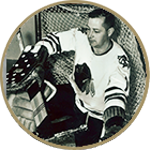 The SJHL Hall of Fame - sponsored by Highwood Distillers and this year’s host sponsor Conexus, is proud to announce the induction of Mr. Glenn Hall.
The SJHL Hall of Fame - sponsored by Highwood Distillers and this year’s host sponsor Conexus, is proud to announce the induction of Mr. Glenn Hall.
Glenn Hall was given the nickname of "Mr. Goalie" during what was a lengthy and successful career in the NHL. He was the first goalie to develop and use the butterfly techniqu - a technique that goalies across the world still use today.
Hall was born in Humboldt in 1931. He played for the old Humboldt Indians of the SJHL for five games in the 1947 season before coming back to assume the number one goalie spot in 1948. In that 1948 season, Hall went 13-9-2 with a goals against average of 3.63 and one shutout. After stops in Windsor, Edmonton and Indianapolis, Hall wore the uniform of the Detroit Red Wings on a full time basis for the 1955-56 season replacing the legendary Terry Sawchuk. He played in every game that season recording 12 shutouts and winning the Calder Trophy as the league's best rookie. He spent two years in Detroit before moving on to Chicago where he had his best years.
Hall was surprisingly traded by the Wings to Chicago before the start of the 1957 season. He continued his outstanding play by playing in every game until November 8, 1962 when he was forced to sit because of back problems ending what was an amazing streak at 502 games which is a record that will likely never be broken by any goalie.
Hall became a hero to Chicago sports fans in 1961 when he backstopped the team to their first Stanley Cup since 1938.
Hall won the Vezina Trophy in 1967, but he was left unprotected by the Hawks that year and was chosen by the St. Louis Blues in the expansion draft. Hall's first year in St. Louis was an incredible one that ended with the team losing in the Stanley Cup final to the high powered Montreal Canadiens. Despite the fact that the Habs won the Cup, Hall was named the winner of the Conn Smythe Trophy symbolic of playoff MVP.
Hall ended his career with 407 wins, 84 shutouts, and a career goals against average of 2.49. He was voted to eleven All-Star games and was named a first-team all-star a record seven times.
In 1975, he was named to the Hockey Hall of Fame, and in 1998, he was ranked number 16 on "The Hockey News" list of the 100 Greatest Hockey Players. In 2005, he was honoured by his hometown when Humboldt erected a monument outlining his greatness in a park that bears his name.
BILL MCDOUGALL
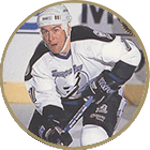 The SJHL Hall of Fame - sponsored by Highwood Distillers and this year’s host sponsor Conexus, is proud to announce the induction of Mr. Bill McDougall.
The SJHL Hall of Fame - sponsored by Highwood Distillers and this year’s host sponsor Conexus, is proud to announce the induction of Mr. Bill McDougall.
Bill McDougall only spent one season in the Saskatchewan Junior Hockey League, but what a season it was. He had one of the best ever seasons a junior "A" hockey player can have in the 1986-87 season with the Humboldt Broncos. After a season of Junior "B" hockey in which he scored 45 goals and 132 points in 42 games for the Streetsville Derbys, the 20 year old decided to continue his hockey career out west with the Broncos.
McDougall made life miserable for SJHL goaltenders that year. He was the top scorer collecting a record 83 goals and 104 assists for a record 187 points. He did that in 61 games meaning he averaged over three points a game. Of his 83 goals, 27 of them came on the power play while nine were shorthanded.
The Broncos hosted the Centennial Cup that year and thanks to McDougall they got to the finals before being beaten by the Richmond Sockeyes of the BCJHL. He showed everyone at that tournament though that his regular season performance was no fluke as he had 11 points in four games and was named the tournament’s all-star center.
McDougall went to the east coast as a 21 year old and played two seasons of senior hockey in Newfoundland putting up astounding numbers before finally getting a chance to play semi-pro hockey in the ECHL. He went to the Erie Panthers and like he did in Humboldt, he dazzled everyone as he had 80 goals and 148 points. He was named the league’s MVP that season.
In January of 1990, he signed a minor league contract with the Detroit Red Wings. With their farm team in Adirondack, he had 10 goals in 11 games . The next season he played full time for Adirondack and he kept raking in the goals as he had 47 of them. He was called up to play with the Wings for two games that year, but he didn’t see much ice time.
McDougall was traded by the Red Wings to the Edmonton Oilers in February of 1992. In the 1993 playoffs, McDougall exploded again registering 26 goals and 26 assists in 16 games to be named playoff MVP in a record performance that still stands. Despite his offensive talents, McDougall could never seem to break through at the NHL level to show his skill. He signed a free agent contract with the Tampa Bay Lightning in 1993 and played 22 games for them getting eight points.
He left for Europe and spent time in Italy, Switzerland and Germany before calling it a career.
McDougall is currently working with local hockey players in Cape Breton. His company, Advance Hockey Development, works with elite hockey players to sharpen their skills.
MICK McGEOUGH
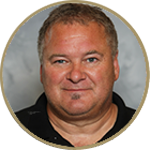 The SJHL Hall of Fame - sponsored by Highwood Distillers and this year’s host sponsor Conexus, is proud to announce the induction of Mr. Mick McGeough.
The SJHL Hall of Fame - sponsored by Highwood Distillers and this year’s host sponsor Conexus, is proud to announce the induction of Mr. Mick McGeough.
One of the more controversial referees, the NHL has seen, Mick McGeough got his start working games at the age of 23 following a hockey career that wrapped up in Spokane, Washington in the Western International Hockey League. McGeough called many a game in both the WHL and the SJHL, but he started out as a linesman. He worked only a handful of games as a linesman before WHL officials supervisor Ernie Pawliw suggested he give refereeing a try. McGeough took Pawliw up on his advice and it may have been the smartest thing he has ever done. His personality and hockey smarts helped him move up the ladder in the WHL to the point that he was considered the league's best referee. His WHL career culminated with him officiating the 1986 Memorial Cup final in Portland, Oregon.
He moved into the NHL in 1987 and donned the orange armbands for the first time on January 12, 1989. He reached a milestone on February 3, 2007 when he refereed his 1,000th career game. When he blew the whistle for the final time later that year, he ended a career that saw him reach the two goals he set out when he started. Those goals were lasting 20 years and doing more than one thousand games. He did that as he officiated 1,063 regular season games and 63 playoff games including the 2006 Stanley Cup final. He also was the referee at the 2001 All-Star Game.
In addition to his sound refereeing habits, McGeough took some endless ribbing about his career because of his fictitious nemesis which was the bald, bulbous headed cartoon character with inch thick glasses named "Mr. Magoo". McGeough, like Magoo, always found a way to land on his feet or at least one foot with arms frantically rotating keeping him upright. Fans in many NHL rinks were treated on occasion to seeing "The McGeough Shuffle". He is truly considered to be one of the game’s all-time’s greatest characters.
2002-03 BRONCOS
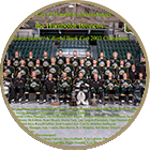 The SJHL Hall of Fame- presented by Highwood Distillers and this year's host sponsor Conexus, is proud to announce the induction of the 2002-2003 Humboldt Broncos.
The SJHL Hall of Fame- presented by Highwood Distillers and this year's host sponsor Conexus, is proud to announce the induction of the 2002-2003 Humboldt Broncos.
The 2002-03 edition of the Humboldt Broncos brought the Royal Bank Cup and another national championship to the people of Humboldt and the Elgar Peterson arena.
After a regular season that saw the team post a record of 39-12-6-3, they won the league championship with a victory over the Melville Millionaires and followed that up with an ANAVET Cup victory over the Manitoba Junior Hockey League champion OCN Blizzard to earn a ticket to the 2003 Royal Bank Cup in Charlottetown, Prince Edward Island.
The team was not only talented, but it was tough. Keith Reade had 36 goals and 46 assists for 82 points to lead the team in scoring. He also had a team leading 295 penalty minutes. Two other players, forward Jeremy Wray and defenceman Craig Olynick, each had 277 penalty minutes.
In their first game at the RBC, the Broncos beat the Wellington, Ontario Dukes by a score of 4-1. Josh Podaima scored a pair of 3rd period goals - one shorthanded, one on the power-play to salt the victory away.
After a 5-4 loss to Lennoxville, Quebec in their 2nd game, the Broncos improved their record to 2-1 with an 8-5 win over the host Charlottetown Abbies. The team scored six power play goals in recording the victory with Podaima scoring two more goals.
The roller-coaster round-robin continued with a 5-3 loss to the Pacific reps –the Camrose Kodiaks—setting up a semi-final game with Wellington. The game was a back and forth affair that wasn’t decided until late in the 3rd period when Reade scored his 2nd goal of the game unassisted at the 17:21 mark. It set up what would be a championship final against the Kodiaks.
Humboldt took a 2-0 lead in the first period on goals from Matt Brown and Kris Kasper, before Camrose answered with a late power play goal from Matt McKnight with only 11 seconds to play in the first frame.
The second period featured close checking and very physical play. Eight power play opportunities were presented to the teams, but no one was able to find a way to beat either of the goaltenders.
The third period continued to showcase great defensive play and superb saves by both goaltenders, Sean Connors (Humboldt) and Mike Brodeur (Camrose). Humboldt added an empty net goal by Brown, with his second marker of the game, in the final moments to ensure the National Championship.
Craig Olynick was named the tournament’s MVP and top defenceman while Podaima was the top scorer.
DR. TERRY HENNING
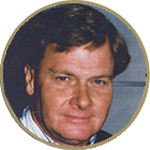 The SJHL Hall of Fame- presented by Highwood Distillers and this year's host sponsor Conexus, is proud to announce the induction of Dr. Terry Henning.
The SJHL Hall of Fame- presented by Highwood Distillers and this year's host sponsor Conexus, is proud to announce the induction of Dr. Terry Henning.
Dr. Terry Henning had a solid hockey background on his resume already before setting up shop as a general practitioner in Humboldt in 1965. Henning, a Regina native, had played in the Regina Pats organization in the 1950’s alongside players like Terry Harper, Bill Hicke and Red Berenson before going on to play with the University of Saskatchewan Huskies.
When he arrived in Humboldt in the fall of 1965, the juvenile hockey team needed a coach, so Henning volunteered. When asked why he volunteered, Henning answers without hesitating "stupidity". His coaching style worked though as he coached several different Humboldt teams to provincial championships at different levels. He says the reason he got into coaching was he had a lot of people teach him things that he wanted to pass on to young people to make them better athletes and better individuals.
It wasn’t just in hockey where Henning excelled as a coach. He was also the coach of the Humboldt Legion Swim Club that won twelve provincial championships.
Because of his success on the ice, Henning was asked to coach the Humboldt Broncos as they started as a franchise in the SJHL in the 1970 season.
Henning’s team won the league final in 1972 and 1973. In 1973, the Broncos took on the Portage Terriers for the ANAVET Cup and it was a series embroiled in controversy. The Broncos withdrew from the best-of-seven series after five games, fearing injury from what they alleged to be brutal tactics and dirty hockey. It’s something that resulted in Henning and the tea’'s manager and fellow SJHL Hall of Fame inductee Dr. Gerry Rooney being suspended by the Canadian Amateur Hockey Association. That suspension was later lifted. Henning says it’s a move he doesn’t regret making and that if he had to do it over again, he would have done it sooner.
Henning came back to the Broncos in 1987 as he worked one season for the club as their director of hockey operations. It was a year that saw the team win the league title and host the Centennial Cup. They lost the Centennial Cup final that year to the BC Junior League’s Richmond Sockeyes.
Henning remained in Humboldt until leaving in 1999. He is currently retired and living in Nanaimo, BC.
DR. GERRY ROONEY
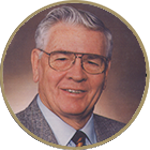 The SJHL Hall of Fame - sponsored by Highwood Distillers and this year’s host sponsor Conexus, is proud to announce the induction of Dr. Gerry Rooney.
The SJHL Hall of Fame - sponsored by Highwood Distillers and this year’s host sponsor Conexus, is proud to announce the induction of Dr. Gerry Rooney.
The Humboldt Broncos may not exist today if it weren’t for Dr. Gerry Rooney. The Estevan native came to Humboldt in 1958 to practice optometry saying he had to get back to Saskatchewan after being in Ottawa.
Rooney did not get involved in the game when he first arrived in Humboldt. His first foray with the sport didn't begin until the early 1960’s when his sons became involved in the sport. He served as a coach with Humboldt minor hockey before being a part of a committee that established the Broncos organization that people in the town love today.
In the late 1960’s, Rooney had a conversation with a man from Swift Current named Mike Shabaga. He had come to Humboldt to meet Rooney to see if Humboldt wanted to put together a junior "A" franchise that would be affiliated with their franchise in the Western Canada Hockey League. After speaking with Mel Dagenais and Leo Wurtz, it was decided to give it a try. He says he had no idea if they would become competitive, but because they had won provincial championships at the midget and juvenile level and had won a bantam provincial championship the year before that it would give local kids a chance to play a better brand of hockey.
Rooney also accepted an offer from the Swift Current franchise to take two sets of sweaters off their hand. The sweaters had "Broncos" written across their chest. With that and a three-thousand dollar gift from Swift Current to help with expenses in getting the team off the ground, the team was born. They had immediate success making it all the way to the league final in their first year before losing the championship series to the Weyburn Red Wings.
He stayed with the team until 1976 before leaving, but he was still loosely connected with the organization for a few years after that.
Rooney not only coached hockey, but he was also actively involved with baseball in the community through the 60’s, 70’s and 80’s. He was also named to a special five person task force commissioned by the Saskatchewan government in 1974.
Rooney retired from the optometry profession and left Humboldt in 2003. He is currently enjoying the retired life in Calgary.
WEYBURN - OCTOBER 10, 2009
DWIGHT McMILLAN
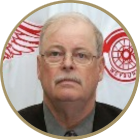 Dwight McMillan fancies himself a hockey coach and nothing else. Forget the 1000-plus wins he has accomplished over his career; McMillan says it's something anybody can do as long as he's blessed to have a long career behind the bench. McMillan views the last 37 years as one big cycle that keeps repeating itself season after season after season.
Dwight McMillan fancies himself a hockey coach and nothing else. Forget the 1000-plus wins he has accomplished over his career; McMillan says it's something anybody can do as long as he's blessed to have a long career behind the bench. McMillan views the last 37 years as one big cycle that keeps repeating itself season after season after season.
It's a good thing Dwight McMillan isn't writing his own biography, because we'd be left wondering how this modest man ever got into the SJHL Hall Of Fame. The fact remains, McMillan is a hockey coaching legend. He picked up career win number 1000 in early February 2008, putting him in an elite group of company with Scotty Bowman (NHL) and Brian Kilrea (OHL) as the only coaches in the history of hockey to win that many contests. McMillan says while the feat is a great accomplishment, it doesn't actually mean all that much. "You coach every game and it ends up being every year and before you know it, you have all of these wins. It doesn't mean you are going to win the next game, which is what I always want to do. But, it's nice. It tells you that you have been around for a long time and have been successful. The goal is to coach every game and enjoy it, while trying to promote the kids. If it's 50 wins or a thousand, it's good," he says.
Aside from two years in the late 1980's, Dwight McMillan has coached the Weyburn Red Wings since 1972. His own Red Wing history dates back to the very first Red Wing team of 1961, of which Dwight was a rookie player; having been recruited by a Detroit pro scout from Edmonton. "I played until 1964 and then tried out for the Detroit Red Wings. I was traded to New York and played for their farm team for half a year and decided I better come home because I just wasn’t going to make it," said McMillan.
McMillan was asked to coach the Junior 'B' Wings in 1967 and the team, promptly, won two championships in each of his first two years. "I, actually, never thought about coaching at all until Jack Shupe approached my boss at work and convinced him that I should coach. In those days, your boss had a lot more influence and authority than he does now, so when he told me I'd coach or else; I just decided that is what would be best." Incidentally, McMillan and Ron Rumball also coached a fastball team that had just won the 1972 national championship; so as soon as they got home, they started training camp.
At the time (1972), the Wings were, essentially, broke. McMillan is convinced the only reason he and Rumball were asked to take on the task was because they worked cheap. "They had nobody else to come in and take it. I didn't apply and I don't think Ron did either. I think the team had five players on their protected list, other than those that were returning from the previous year. We went all over the countryside looking for players," he recalls.
The Red Wings, with McMillan and Rumball running the on-ice operations, won a national Junior 'A' championship in 1984; which McMillan says is interesting because the 1983 team was better. "The team we built in 1983 was definitely better, but we ended up with a lot of injuries and couldn't finish the job. In 1984, we had a lot of carry over and the big thing was that the players really wanted to win so they took it upon themselves. I remember John Corrigan making some big saves to win 3-0 over Orillia in the final game. When you talk about memories, I think about how well he played in that game and how great the boys were that year."
The Red Wings made multiple trips to the national championship tournament; but didn't pull off another crown (RBC Cup) until 2005, when they were the Cinderella story of the event they hosted; defeating Camrose in the final game; thrilling the hometown fans.
As McMillan reflects on influences and how long he's been around the game, he puts a few things into perspective. "I was raised in the District of Bear Island and went to the country school. I played on outdoor ice until I was 14 years-old. We have come a long way since those days. Just last year, the Red Wings installed luxury boxes," he chuckles.
McMillan credits his dad and a man from England he still, respectfully, calls Mr. Proud. I was in grade five and he really lived up to his name. He drove all of his students to do the best we could. Hockey, ball, running, you name it. He promoted each of us to be the best we could be and he installed the one thing all competitors need and that is to go flat out in whatever you do."
If McMillan is anything like his dad, he may coach his way to 2000 wins. "My dad is 93 years-old and he came to Weyburn this summer to play a game of golf at White Bear. He went all nine holes. He lives alone without any help. He does everything. He cooks his own meals, walks everyday, you name it." When it's suggested to him that he, himself, may still be coaching when most men his age should be long retired from the game, Dwight says, "You might be right. I don't know anything different."
RON RUMBALL
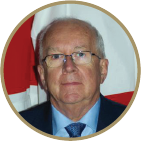 It was the Fall of 1966 and the community of Weyburn had no idea a future legend was entering the city when Ron Rumball took a position to be Vice Principal at Haig Elementary School.
It was the Fall of 1966 and the community of Weyburn had no idea a future legend was entering the city when Ron Rumball took a position to be Vice Principal at Haig Elementary School.
From there, the native of Bladworth SK (north of Davidson SK) became locked into the Weyburn Red Wings and a path of success was soon to follow.
The Red Wings became a Junior 'A' program in 1969 and Ron was on the Board of Directors. In 1972, he joined forces with Dwight McMillan (for a second time, the first was with the Junior 'B' program in 1966) and began helping to stock the cupboard with prospects. "I was definitely the apprentice. We did a lot of miles together. I remember we didn't have a lot to work with when we took over," says Rumball.
Ron says his role flip flopped throughout the 70's and 80's from Board of Director to Director of Scouting to Team Manager. "In those days, the roles for all of those jobs is different than it is today. There was a period of four or five years in which Dwight wasn't coaching and so I filled in as an interim coach for a few weeks at a time. I never had any aspirations to be a full-time coach and with my professional career as a teacher, I really couldn't anyway," he says.
Rumball became full-time General Manager in 1995 and he continues to serve in that capacity today.
Championships are extremely familiar to Rumball, as Weyburn has won SJHL crowns in 1970, 1971, 1984, 1994, 1995, 1997, 1998, and 2001. They also were arch-rivals for the Prince Albert Raiders when the Raiders won seven straight SJHL championships from 1976-82.
The Wings also won the Centennial Cup (now the RBC Cup) in 1984 and also captured a surprise national crown in 2005 when the city of Weyburn actually hosted the RBC Cup.
2005 was a year in which the Red Wing management team may have pulled off their biggest magic act ever. After a fifth place finish in the Sherwood Conference and a disastrous first round playoff that saw them blow a 3-games-to-0 lead against the Humboldt Broncos; the Wings regrouped to play outstanding hockey when it mattered the most. "We played our last game on March 5th and then brought everyone back on April 5th for our second training camp of the year. We, basically, started the season over and the RBC opened on May 5th. We lost our first game against Portage, in overtime, but then won every single game after that."
Rumball says it is unbelievable to have been part of an organization that played for the Memorial Cup, Centennial Cup, and RBC Cup. "I remember everyone getting on the train to play for the Memorial Cup at the Montreal Forum and then reading the reports in the Montreal Gazette about a small town from the prairies playing the best hockey of any team the Montreal Junior Canadiens had seen all season. There were six players on that Montreal team that went up to play for the Habs next year."
The Saskatchewan Junior Hockey League is proud to enshrine Ron Rumball to the Hall Of Fame.
WAYNE KARTUSCH
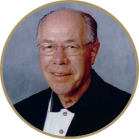 Regina native Wayne Kartusch played competitive hockey in the Regina Pats minor hockey system before graduating in 1958 to the junior program. Following two seasons with the pats, he received a scholarship to the University of Michigan, graduating in 1964 with a Bachelor of Science. A year later, he obtained his Masters in Education from Pittsburgh.
Regina native Wayne Kartusch played competitive hockey in the Regina Pats minor hockey system before graduating in 1958 to the junior program. Following two seasons with the pats, he received a scholarship to the University of Michigan, graduating in 1964 with a Bachelor of Science. A year later, he obtained his Masters in Education from Pittsburgh.
Kartusch came to hockey prominence as far as the Saskatchewan Junior Hockey League is concerned in 1972 when he took over as head coach of the Regina Pat Blues. In 1974, he was named SJHL Coach Of The Year.
He is best known, however, for serving as Saskatchewan Junior Hockey League President from 1977-2003, a span of 26 years. Never afraid to tackle issues and take on leadership roles across the country, Kartusch became Chair of Junior Hockey for Saskatchewan Hockey Association in 1979. Throughout his tenure, Kartusch developed the SJHL into a powerhouse amongst Junior ‘A’ hockey leagues in Canada as he oversaw the league during the glory years of the Prince Albert Raiders in the late 1970’s.
The SJHL also enjoyed the addition of several successful franchises during the peak of Kartusch’s career as the Melfort Mustangs quickly became one of the more pleasant stories in Canada, hosting the RBC Cup in 1996. The addition of the Kindersley Klippers, who have won two league titles in their, relative, short existence has proven to be another added flavor of competitiveness. Adding the La Ronge Ice Wolves has given the SJHL a true Saskatchewan wide presence.
During his time as President of the SJHL, Wayne was a Director of the Junior Council for the Canadian Hockey Association and served on the Hockey Development Council. While at the Hockey Development Council, Kartusch was instrumental in the creation of the Canadian Development Model which is still used nation-wide to this day in developing players from a young age all the way up through junior hockey and beyond. This model has been adopted by almost every hockey nation to encourage growth of their hockey programs.
Upon retiring his post from the SJHL in 2003, Kartusch was immediately heaped with an abundance of awards and recognition. He was given a lifetime membership with the SHA, the highest honor attainable. He was also bestowed as an Honorary Life Member with the CJHL and given Hockey Canada’s highest honor with the Volunteer Of The Year. The SJHL honored Kartusch with the William Shinske Award as Builder Of The Year.
Kartusch was enshrined in the Saskatchewan Sports Hall Of Fame in 2007 and he’s now an inaugural member of the SJHL Hall Of Fame.
CHRIS CHELIOS
 Chris Chelios just might be the best American born player to ever play in the National Hockey League, which should also make him the top United States product to ever suit up for a Saskatchewan Junior Hockey League team.
Chris Chelios just might be the best American born player to ever play in the National Hockey League, which should also make him the top United States product to ever suit up for a Saskatchewan Junior Hockey League team.
It's hard to believe Chelios was cut from two Junior 'B' clubs on his initial trip to Canada and was forced to borrow money just to get home to California. His return to Canada the next year went much better.
Chelios played with the Moose Jaw Canucks for three years, beginning in the fall of 1979 and ending in the spring of 1981. In his final season, he racked up 23-goals and 64-assists in 54-games; ending his SJHL career with 131-games, 38-goals, 111-assists, and 149-points. He won the SJHL Leadership Award in 1980 and 1981.
Following his SJHL career, Chelios went on to play for two years in the NCAA with the Wisconsin Badgers, where he left following his sophomore campaign, in which he compiled a total of 97-points in 88-games. He was also a member of the 1983 NCAA champion Badgers. While with the Badgers, he was named the WCHA Rookie Of The Year in 1982.
Chelios played 12-games for the 1983-84 Montreal Canadiens and was a regular during the playoffs, but he really made an impact beginning in 1984-85. He was named to the NHL All-Star Game and also to the NHL All-Rookie Team. He finished as the runner-up to Mario Lemieux in the balloting for the Calder Trophy (NHL Rookie Of The Year).
He suited up with the Habs right up until his controversial trade to Chicago in June 1990. Chelios and a second rounder went to the Hawks for Denis Savard. Chelios ended up being a regular in NHL All-Star Games and won two Norris Trophies with the Hawks; while Savard never lived up to the lofty expectations.
Chelios was dealt to Detroit during the trade deadline of March 23, 1999. He was 37-years-old; but played for the Wings right up until the end of this past season.
In his NHL career, he has won the Norris Trophy for being the NHL's top defenseman in 1989, 1993, and 1996. Chelios was part of Stanley Cup winning teams in 1986 with Montreal, 2002 with Detroit, and 2008 with the Wings. He was also an integral member and captain of the 1996 United States World Cup Of Hockey championship team.
Chelios keeps himself in incredible physical shape and at the age of 47, isn't ready to hang up the blades quite yet. Remarkably, in an age of frequent turnover on NHL teams, Chelios has played for only three clubs (Montreal, Chicago, and Detroit).
As of the end of the 2009 NHL season, Chelios has played 1645 games and scored 185 goals, 763 assists, and 948 points. In late July, The Hockey News named Chelios the best American born hockey player ever, establishing himself over an impressive tier that includes the likes of Brian Leetch, Pat LaFontaine, and Mike Modano.
The SJHL is proud to enshrine Chris Chelios into the SJHL Hall Of Fame.
RON HEXTALL
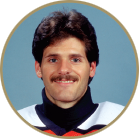 Ron Hextall used the Saskatchewan Junior Hockey League as a springboard to achieving remarkable success in the National Hockey League.
Ron Hextall used the Saskatchewan Junior Hockey League as a springboard to achieving remarkable success in the National Hockey League.
Hextall was the last line of defense and, often, the only line of defense for the Melville Millionaires in the 1980-81 season as the Mils suffered through a miserable year in which they won just eleven games, of which Hextall was credited with eight victories. Without the Brandon MB native that season, the Mils would have been 3-and-22.
Hextall ended up being a perfect icon for the SJHL motto, Rich Tradition Strong Future. From Melville, Hextall went on to the Brandon Wheat Kings of the Western Hockey League where he played for three years, leaving at the end of the 1983-84 campaign with a 29-win year under his belt in his final season.
He spent two years in the American Hockey League and then took the NHL by storm in 1986-87. In his very first National Hockey League season, Hextall won the Vezina Trophy (top NHL goaltender) as well as the Conn Smythe (playoff MVP) as his Philadelphia Flyers pushed the Edmonton Oilers to seven games in the Stanley Cup finals. He was also named to the NHL All-Rookie Team and finished second, to Luc Robitaille, in the balloting for the Calder Trophy (rookie of the year).
The workhorse played more than 60 games in each of his first three seasons and became the first NHL goalie to ever win 30 games in each of his first three years. He also took part in the famed Rendez-Vous 87 in Quebec City, and he also served as Grant Fuhr's back-up in Canada Cup 1988, arguably the best hockey tournament staged ever.
Hextall may best be known for being the first goaltender to ever shoot and score in a National Hockey League game, something he accomplished against the Boston Bruins on December 8, 1987. He also was the first goaltender to ever shoot and score in an NHL playoff game; April 11, 1989 against the Washington Capitals.
His tenure with Philadelphia ended in the summer of 1992 when he was part of the famed Eric Lindros trade. He led Quebec to their first playoff appearance in years in his first year as a Nordique. He also played for the New York Islanders before returning to Philadelphia in 1994. He helped guide the team to another appearance in the Stanley Cup finals in 1997.
He left the game, as a player, at the end of the 1999 season and was inducted into the Philadelphia Flyers Hall Of Fame on February 6, 2008.
Hextall currently serves as the Assistant General Manager of the Los Angeles Kings and the General Manager of the Kings' AHL affiliate the Manchester Monarchs.













